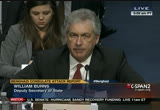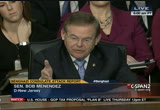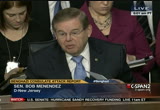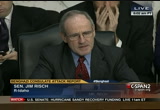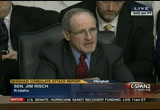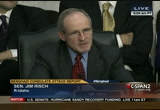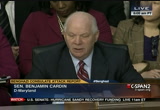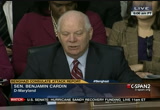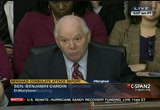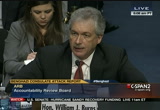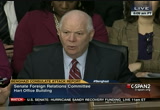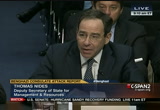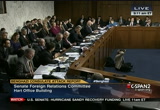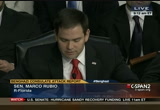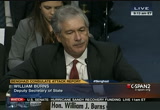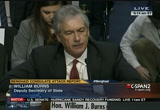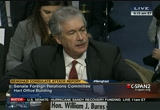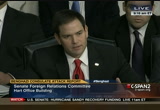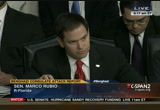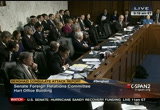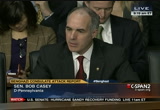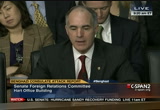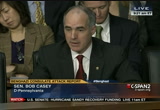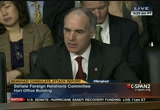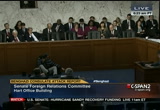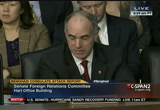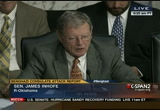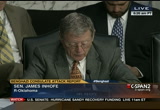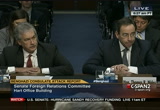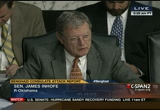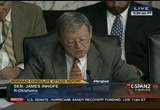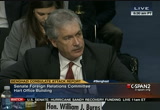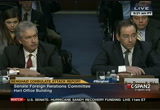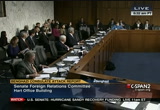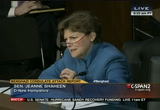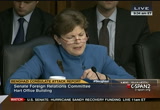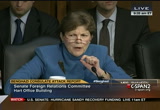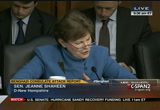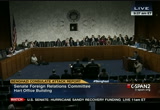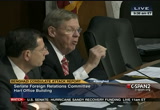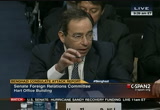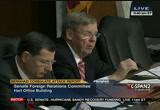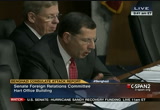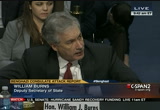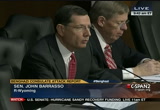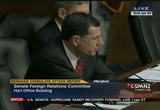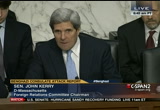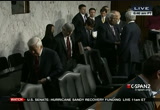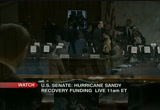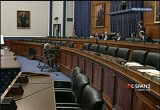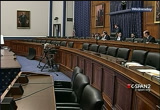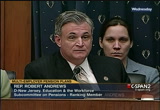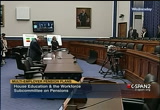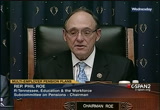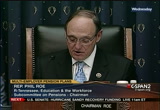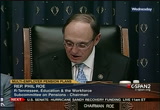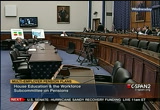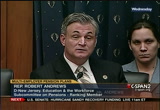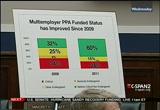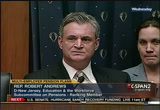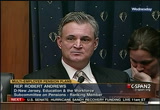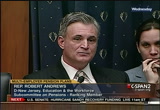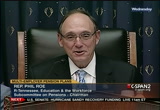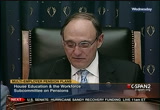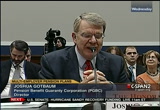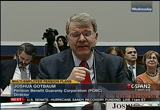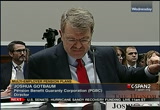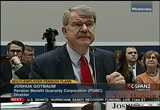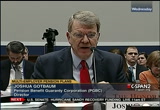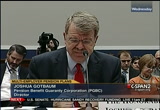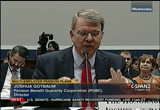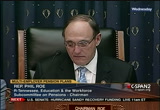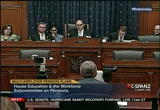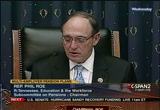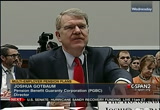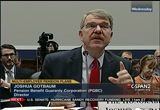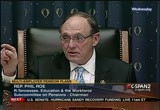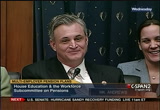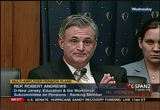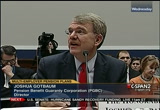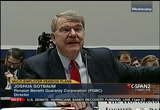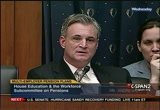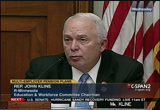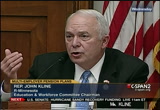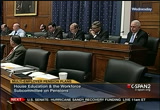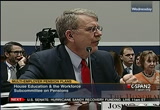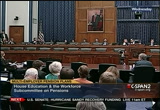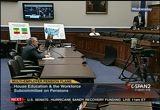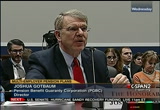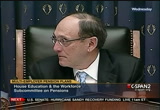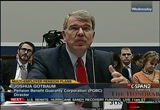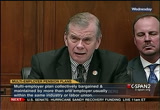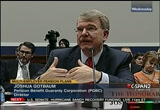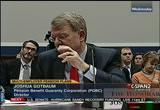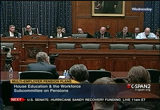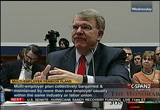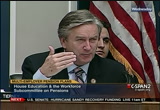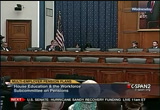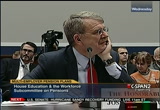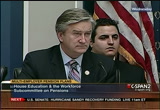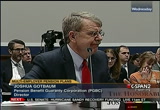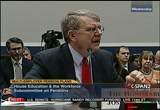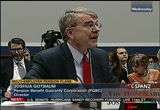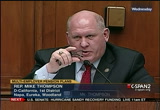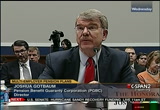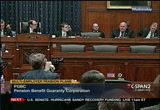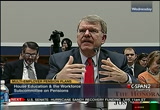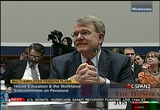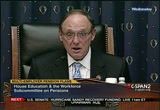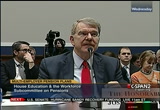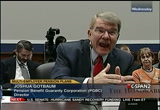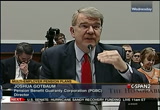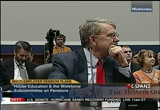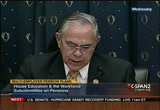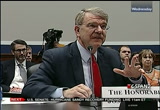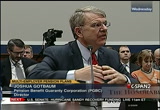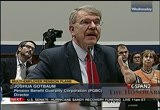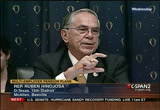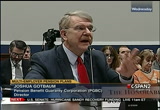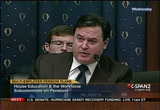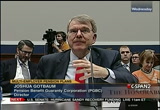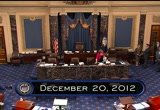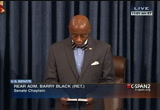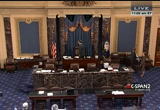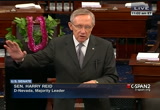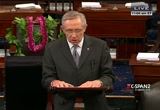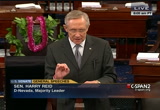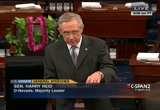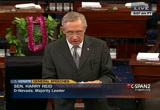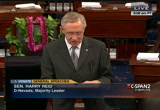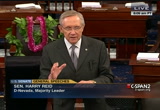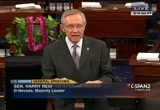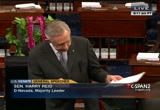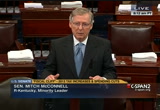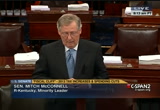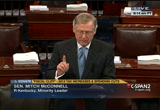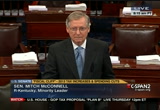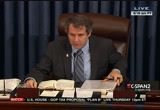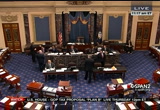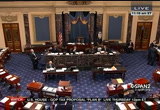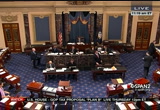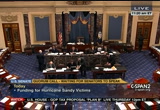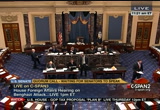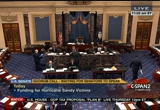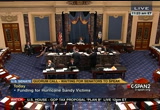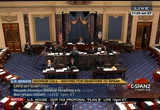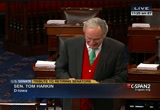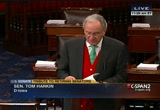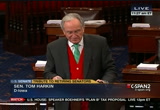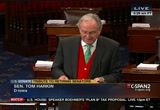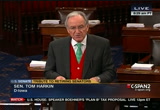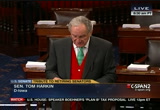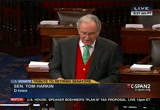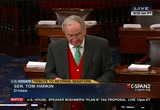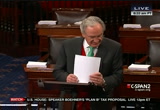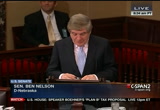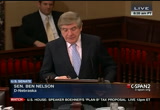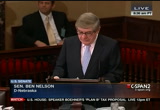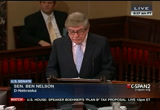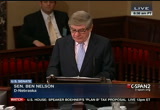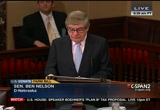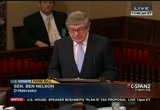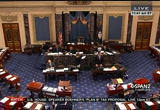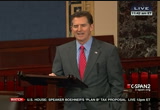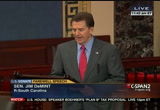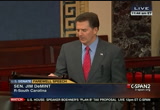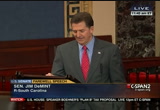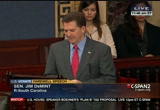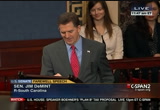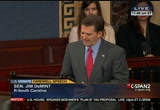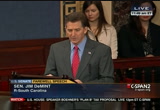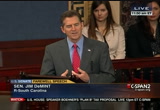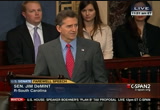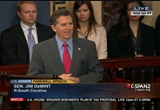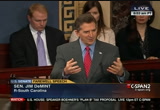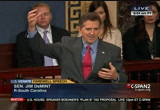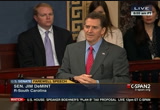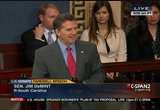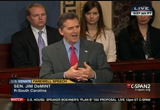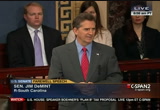tv U.S. Senate CSPAN December 20, 2012 9:00am-12:00pm EST
9:00 am
the truth is, across eastern libya for many months before the attack took place in benghazi, there was a troubling pattern of deteriorating security. not all of it was directed at the united states, but there has been a tendency, not just in case of eastern libya but i think across the world in recent years for us to focus too much on specific credible threat. and sometimes lose the forest through the trees. i think that's something that we were painfully reminded of in the case of the benghazi attack, and we need to do better at. there's some specific recommendations the accountability review board has made that we will implement relentlessly in the state department. we will certainly work with the rest of the intelligence community. >> finally, reading from the report again and having listened to both ambassador pickering and admiral mullen's, where they made it very clear that while there are many mistakes that were made, the outline and respond to do, that significant
9:01 am
problem here is resources. we can either head in the sand or we can ultimately meet that challenge. where they say it's imperative for the state department to be mission-driven rather than resource constrained. particularly with being increasingly -- so in that respect, i hope that when you present your budget, at the same time that you are asking for what the accountability review board has recommended as one of its recommendations, got in touch also give us the sense of the reforms that you are pursuing so the congress will feel even more empowered to be responsible and to therefore help you meet the challenges of our diplomatic support. >> thank you, mr. chairman. first of all, it's really unfortunate that we have to go
9:02 am
through an incident like this in order to get our act together, if you would. everybody here has been through embassies all over the world. and what has always struck me, first of all, i feel really good when you see those marines standing there and they say good morning to you when you're walking. but usually before the you have to go through a tranche of these locals, as you have told us, that operate under agreement to protect our operations in their own countries. and you know, the rules have really changed over the last 200 years, and those, you get a real sense of incompetence when you go through there. generally those people are confused. most of them, you wouldn't need going into a theater here in the united states having the kind of competency that they have. so i guess what you're going to
9:03 am
have to do is instead of treating all these the same, each one will have to be treated differently. every host country will have to be treated differently because our reputation in the world, or the feeling about americans in the world has changed dramatically over the last 200 years. and there's countries, such as western europe, where you don't, we don't have to have what we have and yet you go to other places, and i've been shocked in some of the countries i've been in that are not country from the to the united states singh a minimal amount of marine presence that we have had there. and then, of course, we all learned, i think, at least i did for the first time, or i guess i heard it, it didn't stick previously, that the marines are there to guard the documents. that's shocking. their first obligation to be to protect americans that are serving in that embassy. i'm hoping that's going to change. i'm sure it will change.
9:04 am
and it would seem to me the rules of engagement really need to be reviewed. i look at those people streaming through the front gates in benghazi. that would have taken that much to stop that attack if indeed they would have responded to it immediately, it seems to me. again, you are looking at film and understand it's a lot more sterile than actually being there on the ground at the time, but when armed people are coming to the front gate, it seems to me that's a time to do something about it and nothing was done about it until virtually everybody was in. so again, i really don't have any questions for you. i have looked at the review board. we all have our own view, maybe what should be stronger, what should be less, but the bottom line, the take away for me is things are going to have to be done a lot different than what they have been done. and we really need to discriminate amongst countries as to what kind of effort that
9:05 am
we put forward. so with that i will yield the rest of my time. thanks. >> good observations. senator cardin. >> thank you, mr. chairman. i also want to add my congratulations to senator lugar for his incredible career. we are losing a real partner on this committee in the united states senate but we know you'll continue your service to country. thank you very much. and to secretary burns much. and to secretary burns and i, to thank you for your service and our prayers once again go out to those who were lost in benghazi. i want to follow-up on, and one other point i might make, mr. chairman, and that is i know you worked on the state authorization bill. you've had discussions but i think it's important in the next congress that we have a full committee discussion on state department authorization act. so that we can weigh in a more deliberative way on the policies, under the responsibility of this committee. i want to follow up on both senator corker and senator mendez's points on intelligence,
9:06 am
recommendation 21 is very clear on this that host 2001 intelligence collection has expanded exponentially. that's true, but benghazi attacks are a stark reminder that we cannot over rely on the certainty or even likelihood of wanting intelligence. and that careful attention should be given to factor showing deterioration threat, situations in general on a basis for the action. let me just point out that it was clear in benghazi that the security was deteriorating. may be nonspecific threats. we didn't have information about that. that was also clear. we also knew that the local security team was not 100% reliable. that was known. and yet, the security details that we had in benghazi as the report points out was inadequate. so i would like you to expand more on how we are going to
9:07 am
institutionalize careful attention so that we do not allow situations such like benghazi to occur in the future. you can't eliminate all threats, we know that, but we also understand there was not adequate security at the benghazi facility, based upon the deteriorating circumstances. how do we institutionalize that careful attention to make sure that in those types of dangerous assignments that we have adequate security? i want to add one more thing. ambassador stevens new libya perhaps better than any other american. his judgment will never be second guessed. but it's important that in dangerous posts that there be more than just the head of mission who is responsible for his security, no question about it, but that he had the best advice on a broader basis, as we go into these types of
9:08 am
circumstances. how do we institutionalize that? >> let me start, senator, because you raise a very good point. i think the truth is, as i said before, first with regard to the intelligence that there was a troubling pattern that had developed a a lot of the violence and the security answers were in trouble at the. some of them were directed at the united states and western targets but not all of them. i think we made a mistake and assumption that we wouldn't become a major target. >> the anniversary of 9/11 to a lot of recent -- >> there were a number of different motives, potential motives as they a or b report makes clear. as you said, chris stephens understood in gaza as was anyone and understood the risks as well as anyone, but i think one of the painful lessons we've learned is the imports of being able to take a step back and try to analyze better the broader pattern of security challenges that were emerging. so there's a sense of response build on the part of all of us in the state department for trying to better understand those challenges, not be fixated
9:09 am
on credible threats and taken into account in keeping with what was the obvious security and adequacies made all these by the accountability review board in benghazi spent on non-going to be interested and i think all the members will be interested as to how you institutionalize that review that go beyond just simple threats. i would hope you would share -- secretary, you mentioned i think he said streamlining a process or you could move quicker to implement. you also mentioned there may be some concerned with additional marine assignments with the host country. is there anything that we need to be aware of as you implement these recommendations as it relates to bureaucratic streamlines americorps congressional attention, or problems with host countries as we put more, want to put more marines in state, and country? >> senator, thank you.
9:10 am
unprecedented cooperation with the state department and defense department i should say. coming, not only do they agree to send very confident, very trained officials with our state department, colleagues to the 19 posts immediately right after the incident to evaluate all these countries during the period of time where the current unrest is going on. but one of the recommendations that came back that general dempsey, along with secretary panetta and secretary clinton, the white house agreed to the use of additional marines detachments would be enormously helpful. again, the senator is correct. the mission of those marines is, in fact, a statutory to protect classified information. but there's also no question for all of us who have come into those embassies with the marine detachment, they are a deterrent. it comes with a lot of other things.
9:11 am
so the additional requests of the 35 additional detachments which include about 250 additional marines, we will also be asking to build potential barracks on our ground where we possibly can so the marines, five individuals at each task can essentially live on facilities or close by. so the cooperation between the defense department and state department, in my view, is somewhat unprecedented for a situation like this. we will be coming to the congress for not only appropriations, but also potentially the authorities in which we will be working with dod and discussing that with the relevant committee. >> thank you, senator cardin. >> thank you, mr. chairman but i want to begin by commending senator lugar on service to our country. and what i'm about to say i hope you'll take a couple. i've been watching you since i was in high school, and i mean that as a couplet. i was going up to -- i have a
9:12 am
passion for foreign policy partially by watching your career, and i'm just pleased i got a chance to serve with you for two years on that, on this committee. i also want to thank you for your service for country. i didn't have done because i know how un-warping the job can be at times. but how awarding it can be another's. i want to say this report i think is really furthered our instant of what happened in benghazi, and i appreciate. there's one part of this, i don't to say the word concern but i'm a bit puzzled and that's, in places, a lot of the blame on lower level officials, particularly assistant secretary level officials. why i find that quite puzzling is because benghazi and lived in general is not some remote outpost. it's not luxembourg. this is a country we are involved in military not so long ago in a high profile intervention. some curious because on page five of the report, it talks about, it was not a priority for washington. special mission was not a priority for washington when it
9:13 am
came to security related requests. especially those related to staffing. i want to understand who washington is. and in that frame of mind i think the secretary brings out a number of question. i know secretary clinton visited libya in october 20 of them. did the security situation come up with during her visit there, whether it was a country thing or in her interaction with the libyans? >> senator, i'm sure in general terms that it did. i wasn't on the trips i don't know specifically. i can speak to my own experience. i've also visited libya -- >> in july? >> i visited in july but i also visited in september after the attack on benghazi. so i can speak to my own experience. you know, went secretary clinton said all of his senior leaders in the department are accountable and responsible for what happened at it certainly felt myself. ihop the remains of my former colleagues back after the attack in benghazi. had been in the middle east on a trip and cut short to come back
9:14 am
with them. and all that long flight home i certainly have a lot of time to think about sharper questions that i could've asked, sharper focus that i could have provided. spent on your visit in july or september, did you -- >> july, yes. >> did that issue come up? did the folks on the ground say to you we are really worried about what's happening here with security? we've made a number of requests? >> there was no specific question about that. i did talk to ambassador stevens about the security situation but we didn't talk about specifics at the time. >> secretary clinton met with the prime minister in march with -- you know if the security situation came up at the time? >> i'm certain it did. you know, we certainly emphasized the importance of not only come the, improving the security capabilities of the libyan interim government at that time. we offered a number of programs to help them build those institutions which remained one
9:15 am
of the greatest weaknesses of the libyan interim government. that was essential feature as it was when i met -- >> but you don't know, you're pretty sure the issue came up. you just don't know the full content? >> i don't know the details think you met with the deputy by much of this year. did it, but that meeting? >> again, the focus there was on urging them at offering support to their development security institutions which at that time and to this day are still extremely weak. >> [inaudible] regarding the security situation and to what level do those cables get reduce? >> they certainly would've been reviewed up through assistant secretary level, and it may be some of my colleagues on the seventh foresaw them as well. >> so beyond that level, were any senior officials beyond the assistant secretary level made aware of the reputed request from the post for extended or additional security?
9:16 am
do you know beyond the assistant secretaries level, some other written documents because i'm not aware aware of any specific memo that went beyond the sixth floor with regard to the specific request at that time. >> do you know if anyone did on assistant secretary level going up to the secretaries level, where they made aware of the more than 200 security incidents that have occurred and been gaza into 13 months leading up to the attack of? >> there were certainly memo's that came up to the seventh floor that talked about the deteriorating security situation in eastern libya, yes or. >> after all these different has to live it yourself, secretary and others, other senior officials in the state department, are there any memos produced after those visits basically saying we've been to libya, and by the way, there are two things the station is concerned about the security in general and the libyans are concerned about their ability to provide security as we are relying on them? do you know if any memos were
9:17 am
produced about that above the assistant secretary level? whether any memos produced? >> there were certainly meetings that took place at at senior levels with regard to the situation in general, and particularly with regard to the concern about the very weak security capabilities of the libyan government at that time. and so certainly that was a subject of fairly consistent concern as i said, we made a number of offers and on a number of occasions, pushed the libyan interim government to try to move to accelerate their efforts to develop -- which related directly to security. >> beyond the assistant secretary level there was a general and specific awareness of the rapidly deteriorated security situation in libya of the repeated requests from the team on the ground for security, and the inability of the libyans to -- >> senator, what i would say there was certainly a general awareness of old the
9:18 am
deteriorating security situation in eastern libya and also not only a general awareness but a real concern about the difficulty the libyan interim government was having in developing capable security. >> above the assistant secretary level, correct? >> the awareness with regard to the incapacity of the libyan interim government in development security institutions yesterday and we worked hardest to push the libyans to move fast in that direction. >> thank you. >> senator casey. >> thank you, mr. chairman. and i want to reiterate what has been said by many on this panel today about senator lugar's great leadership, and been a mentor to someone those even when he didn't even know his being a a mentor, and great example to us. grateful for his service to and i hope you'll continue to serve in another capacity for many capacities. we also, i want to express again the condolences that i have, i know, so many of us in this room
9:19 am
about the loss the state department suffered, ambassador stevens and the others who were killed. and that's why the questions that we are debating are so grave and so meaningful. as reflecting upon the challenge that you both have and the state department has in light of the report, and in light of the subject matter that led to the report, because of that i guess you try to think in your own mind what experiences are relevant to inform the question that you have, or the points that you want to make. to are relevant in my life. one is traveling that i've done across the world as a member of this committee three times in pakistan, three times afghanistan, several trips to the middle east. last time senator shaheen and i were traveling together. and seeing the difficulty of providing security, not only for
9:20 am
folks and embassies and consulates, but when members of congress travel, and the danger that we feel sometimes. even with the knowledge that when security around us. but getting that balance is right, but as you know we do have to get it right every time. and taxpayers expect that and expect us to put forth every effort. they expected of you. they also expected of us. the other experience i had as a state official leak investigation and audits of public agencies. and at times kicking the hell out of them, really hitting them hard in very critical, calling for people to be fired, demanding accountability for tax dollars and four results. i do know this though. when a report is issued and findings are made, you can't simply have us, congress, or in the case of state officials in my experience, just yelling and
9:21 am
screaming about the results. yelling and screaming about recommendations. resources matter. whether its personnel or, in the case of some of the work i did, information technology, hardware, whatever it takes we got to dedicate the resources. we cannot get the results you want just by yelling and screaming. you've got to have investment and resources. third point i would make is that your credibility at the department will be greatly enhanced by the pace of implementation, by the demonstrable success you have. in other words, that taxpayers can see that you have made those changes, and by the steps you are taking now in the next couple of days and weeks. that's mostly important for the
9:22 am
broader concerns that we have, but it's especially important when you come back here and ask for dollars. i will stand with anyone to say that resources matter. i know that from personal experience, but your credibility would be enhanced when you ask for those resources, when you can specifically focus on what those resources will go for, and how you're going to be able to change the dynamics. so let me, i know i don't have much time, but with a predicate company asked a question that i'm not sure has been raised yet. may be too quick questions. number one, host country cooperation and partnership. i know there's great variance, very to by country and by situation, but if either of you, can speak to the question of the challenge of having host country partisanship. and then if you could just quickly one more time walk through the timeline of some of
9:23 am
the recommendations. >> first, senator casey, i mean obviously one of the lessons of all the changes have taken place across the middle east in the last couple of years is you have revolutions impose revolutionary governments coming into place is that the development of security institutions in those countries and the capacity for following through on their vienna convention obligations for protecting foreign diplomats is a very uneven and sometimes extremely weak. and that's something we have to both understand and adapt to come and that's exactly as tom described earlier what we're determined to do as we make changes and strengthen our security at our diplomatic facilities over the coming years. >> senator, we've done for very quick things. never won, we quickly went up here and asked the appropriations committee for additional funds, for 13. the 13 appropriations process is well on its way as you know.
9:24 am
never one. number two, we formed the isapi make of them out in the field immediately with dod, the 19 posts and will have a recommendation on the high-risk post very soon, very quickly. number three, we took the 60 tasks, excuse me, 29 recommendations broken down into 60 specific tasks, assign figure i'd my first meeting two days ago with a steering committee and with the task force could divide up the timeline, dates, to make sure we execute. many of them hopefully before the end of this calendar year, and be able to set up for the next secretary to come in and ensure we're exiting the rest of them. finally, we named the first ever deputy assistant secretary for high-risk post. we took those for very quick action steps as we proceed and taken the recommendations of the arb. >> please keep us updated as you go. thank you very much. >> senator inhofe. >> thank you, mr. chairman. let me first say that i agree with the senators, senator rubio
9:25 am
in this reference to you, senator lugar, except since we're both in high school at the same time, i didn't get that message. but you've done a wonderful job for a lot of years and we respect you. both senator corker and senator rubio have talked about some of the events leading up to the disaster. however, they assumed i guess that everyone already knew, and i think it's imperative for us to put these things in the record so that we know what signs were out there. i'm referring to the one sentence on the report that says the board found the intelligence provided immediate specific tactical warning of the september 11 attacks. we will run over some of these things and ask you both if you agree with that statement. it's more than a yes or no answer, you can give it for the record. in april, two former security
9:26 am
guards for the consulate in benghazi through ied is over the consulate fans. in may, the offices of the red cross in benghazi were hit by an rpg, and the red cross close their doors and they got out of town. in june, militants detonated an explosive at the perimeter gate at the benghazi consulate, blowing a hole through it large enough for 40 people to go through. in june, a rocket propelled grenade hit a convoy carrying the british ambassador to libya in benghazi. and they, like the red cross, got out of town. they left. in june. ambassador stevens wrote that the al qaeda flags were flying over the government building and training facility in that area. in august, security officers stated that they did not believe benghazi consulate could withstand a quote court made
9:27 am
attack. that's in august and august a state department cable, talking about cable stuck, information that came to you folks, discuss the location of approximately 10 islamist militants, militias and al qaeda training camps within benghazi. on september 4, ambassador stevens warned that lived officials had introduced a state of maximum alert in benghazi. then finally on september 9, ambassador stevens requested additional security two days before it happened. i'd like the rest of the members of this panel, i knew him, i knew him quite well. i a great deal of respect for them. now in light of all these findings, these are facts, that no one is argued, do you come either one of you want to say you agree with the statement that i read first in the report, saying there were no warnings?
9:28 am
>> well, senator, the statement in the report that says that there was no specific tactical threat i think is a statement of fact, but you're right to point out the pattern, the trouble pattern of deuterium security in eastern libya and each of the incidents that you discussed. the reality is that amongst the deterioration come or part of the deterioration was a lot of through libyan violence as well. some of it was targeted against the united states. we did not do a good enough job as the report highlights. in trying to connect the dots between a troubling pattern, even in the absence of an immediate tactical -- >> mr. secretary, i will assume you pretty much agree with this statement he made. now, there isn't time to go into it but for the record if you would, please respond, i would appreciate it. >> yes, i do. spent then there are to question. one not so significant. it's obvious and the other is the most significant question
9:29 am
that it's not covered in the report that i would like to get your response to. the first is worth the comment of ambassador rice completely in accurate, five days after the attack with the video responsible for the deaths of ambassador stevens and three other americans? and the second question, this is the one that is important because we all knew, we have testimony and i will read the testimony of the cia before the house to settle the intelligence community knew from day one that al qaeda terrorists were responsible for deadly benghazi consulate attack, someone cut reference to al qaeda and terrorism from the overview they release on september 14, instead of those talking points they added. now, somebody in the white house, because this report went to the situation room, someone in the white house changed the talking point from general petraeus and the cia before
9:30 am
they're given to ambassador rice. i assume that they were changed, that she was not aware. of course, she was aware. that's not to burden. someone changed it. do either one of you guys know? do you care? >> senator, here's what i would say. what happened in benghazi was clearly a terrorist attack. secretary clinton on the day after the attack said quite directly that what happened in benghazi was an assault by heavily armed militants on our compound. later that same day president obama spoke to an act of terror. what was not clear at the time was exactly which terrorists were involved, what their motives were, exactly how this came about, whether this had been planned well in advance. and i'm convinced, senator, that my colleagues in the administration would address this issue and intelligence professionals on whom they relied operating in good faith. their focus was on being as factual as possible and the focus was on action. and you have to remember, sir,
9:31 am
this time there were mobs coming over the walls of our embassy in cairo, tunis, and that was what people were focused on. and so the initial inaccuracies, because just as the arab report points out, there were no protest before the attack took place. it took several days for the intelligence community to conclude definitively that there were not any protests and that there were -- >> we are running out of time and i want to give the ambassador and opportunity respond. >> actually have run out of time. spent specifically, the report from the cia reference al qaeda and terrorist. that's specific to you can't get any more specific than that. so i will get your response, if you have time, mr. nye, give him time to respond if not he can respond for the record spent on trying to honor other senators who want to get to the daniel inouye ceremony.
9:32 am
i think we have time. >> i concur with secretary burns comments, and they do think that in the agency was operating in good faith. someone who's in the room during those three days with secretary clinton are full and complete focus was on saving lives. sitting there with her as she made calls to leaders of all those countries where our men and women were in danger, that was what our focus was and that is what we spent our time and energies on spin and you don't know who changed the talking points? >> it was an interagency process but i'm not a where a thought that occurred. it was an interagency process. >> i think there is some testimony with respect to that within the intel community. within the intel committee. senator shaking. >> thank you, mr. chairman. and thank you both for being here this winter i think the report, the accountability review board report was very directed it was very honest about pointing out that mistakes
9:33 am
were made within the agency, and hopefully not as result of this report, as you all have indicated, we can move forward. we can hold people accountable. we can make the appropriate changes and follow-up on the lessons that are learned as a result of this tragedy in benghazi. i appreciate secretary clinton taken responsibility for what happened. and as she points out in her letter to this committee for going even further than the reg q conditions in the report to address the mistakes that were made spent if i could just interrupt you there. is i want to put the letter of secretary clinton in the record at this time. >> thank you, mr. chairman. one of the things that you pointed out is that you've got out, or there have been teams to assess in 19 state department locations around the world where they are high risk areas. and i wonder if you can talk
9:34 am
about the metrics that are being used as we think about how we determine what is the high threat, high risk locations, and how we are then responding to those metrics. >> we test the teams between defense department state department with a variety of questions to ask. the principal question asked was what was the ability for the whole of government to protect us, not just their willingness. because all of the countries in which we examined, every one of them without question wanted to protect us spin and i appreciate -- but you gave us that information in your testimony. but i wonder if you could be a little more specific. when we ask that question of what then is the follow-up question speakers for security professionals and examine the
9:35 am
practical things, the ability for fire, protections of perimeter, how close they are to the street. i mean, very exact. we didn't ask them for recommendations. we got any recommendations, things that needed to be done tomorrow, things that need to be done between now and six months. than six months to a year. so we got very exact detailed assessments from each one of the team. we then put them all in the matrix and we're basically going through each one of those requirements, putting budget requirements to it, prioritizing them. we will be coming back to this institution and enlisting you, helping you think to that. but we're getting very -- that was not an esoteric discussion, very clear and very specific requirements for each one of those posts. >> and apropos senator corker and senator casey's questions about implementations of the report, have we attached a timeline to all of the various recommendations for windows are
9:36 am
going to get done? and is that something that can be made available to this committee? >> yes. we have come as put out we broke the right conditions and individual tasks, as monday now that might sound, it is crippling important. we assign individuals to each task. we've given them dates that we want the task completed. and whatever recommendations as we do right on them. we can certainly share that with the committee at the appropriate time. >> thank you. also can you talk about the coordination between the state department and the department of defense? it is a "new york times" story today that points out that at the time of the crisis in benghazi, the pentagon had no forces that could be readily sent. the closest gunship was in afghanistan. there were no armed drones within range. there was no marine expeditionary unit. available to the african command. and given the potential for further unrest in syria, and
9:37 am
egypt and across the middle east, it seems to me that that's a question that is really critical as we look at how we continue to provide protection for our personnel on the ground. >> well, senator, first with regard to the specific issue of benghazi. it was addressed in the report. the arb's judgment, there was not enough time to have use military force to respond to make a difference in that situation. but you raise a very good broader question and service on we will be working to with our colleagues and the pentagon and elsewhere in the administration. >> thank you and again the potential for unrest across the middle east i would hope that we would follow up on the specific question because it seems to me critical as we look at the situation going forward. and i will just conclude by adding my personal thanks and appreciation to senator lugar. it has truly been an honor to serve with you, angeli the
9:38 am
tremendous legacy for this committee and for the country. thank you. >> senator shaheen, thank you. let me just say that i've thought a lot about what you just said with respect to the availability of teens or forces with respect to emergency destruction or emergency response different parts of the world. i think it is something we really need to pay attention to and think about in terms of deployment and preparedness. so we've got to do that. senator isakson. >> i will be real fast so senator barrasso can also ask a question. let me quote my predecessor, senator sam nunn, by saying they don't make them any better by senator dick lugar. i would like to act with that statement. we appreciate you very much. my statement is come in your report, in the report, admiral mullen and secretary pickering, it said there was a culture of which back in the state
9:39 am
department. not a question but a statement. i've seen that culture of pushback. i bend embassies in africa that made requests. security related requests that basically were really minor like securing ground-level residents at an apartment building that couldn't get done until a united states senator asked for. so i think the state department needs to look at the process internally to see to it there's a flow to the pop-up important security is important security because come from industries. that's just a statement on my part. my question is, secretary night, you made a statement and i read the following. let me add, we may need your help in assuring we have the authority to streamline the usual processes and produce fast results. this is related to security. what processes is nipping fast results in terms of security in our embassies? >> i was using it broadly speaking but as you know, every time we put contract out there's a bidding process that needs to take place but nothing can be done quickly as a morning of some of this comes from the private sector and from the
9:40 am
government again for the second time. and it's done rightly, right, as did to put out, contracts are awarded. there's a process. that process unfortunately takes time. we have oversight has to be done. contracts are reported and are challenged. so we may need to ask for some authorities to allow us to expedite some of those. and that is what i was generally talking about. security and other construction. just to build a wall at an embassy could potentially take months to go through the contracting process to get an agreement to get the bid. that's what i was referring to. >> so as competitive bids are required to come is that right? >> i'm not an expert i should be honest with you, but there is, what i am an expert on, nothing can get done quickly. and i think, and some of it is
9:41 am
legitimate. some of it needs to be done quickly and we will need to get the authority with which to do that. >> what we should do, mr. chairman, is investigate negotiated it. there's a way around any security situation where you can react quickly. we ought to give you speed is very good suggestion, center. thank you. senator barrasso? >> thank you, mr. chairman. and first to senator lugar and wyoming, we have a code of the west. and number one is live each day with courage. and number two is take pride in your work and you really are the embodiment, the code of the west. you are always welcome in the rocky mountain west, specifically in wyoming so thank you very much for your leadership, senator lugar. >> thank you. >> for our guests, president obama claims that the moment he heard about the attack o on the u.s. consul in benghazi, he said he did three directives and one of those was to find those was find a to do this work and bring them to justice. secretary clinton's letter to us
9:42 am
just two days ago, she states quote we continue to hunt the terrorists responsible for the attacks in been got seek and are determined to bring them to justice. had to identify the terrorists responsible for the deaths of these four brave americans and the additional injuries and the destruction of u.s. facilities? >> senator barrasso, first just to restate that were absolutely committed to bring those responsible to justice. we are committed to bringing every resource of the u.s. government to bear to accomplish that. we are pursuing this through a number of different channels. some of which can best be discussed in other cities. but as you know the fbi is leading the investigation because the department is very actively supporting this. i've been at liberty to talk to the living leadership about the importance of their cooperation and investigation but i could wear making some progress. ambassador pope works everyday on this issue in support of the fbi. i was in tunisia last week to
9:43 am
emphasize to the tunisian president and prime minister the importance we attach to cooperation of detaining one of the suspects in the benghazi attack. and i believe where making some progress. so the answer is, to your question is we don't have all the edges yet but we're working those were little sick and i think we're making some progress. >> thank you. with regard to in the mentation of the recommendations of this report, you go through the report, senator corker referred to 18 different accountability review boards over a number of years. a recurring theme seems to be stovepipe decision-making. just earlier today i further bureaucratic verbiage of what got to the sixth floor, what got to the seventh floor. that doesn't mean anything to senators or the people at home around the country that see a terrible situation. it's a failed security effort, and truly what is the state department going to do to get beyond this, what goes to what for to make sure this doesn't happen again. >> as someone who has spent a
9:44 am
lot of time in corporate america as well, there is plenty of stovepipe in the goes on there as you're well aware. we've got to learn from it. we've got to hold people accountable, which we're doing, i went to change processes to make sure we're getting it right. we are going to relook at them from how we make our decisions related to the security decisions, how the bureau reacts to that. we are making decisions. we will have to brace ourselves and hold ourselves accountable. secretary clinton is being very clear to us. we are accountable executing these recommendations. we are going to to learn from this quickly and get, get to the bottom of the answers that are setup as it relates to specific tasks as laid out for all of us to look at. >> thank you, mr. chairman. in the interest of time i will -- >> thank you. let me just say as we conclude, i was just thinking, this is a good process. not a fun process, not meant to
9:45 am
be, but it is open accountability. i've been impressed by the directness and professionalism of the report was delivered to us yesterday, but i'm also impressed today by just obvious combination of some pain at the losses that took place for which obviously everybody feels a sense of responsibility within the department. and the acknowledgment, difficult as it is, that mistakes were made, things have to be and particularly. so i just want to salute both of you for coming in here, and i think good questions have been asked, legitimate ones, and this process will result in improvements. i'm confident of that. so we thank you very, very much for coming in today. it's been i think very, very
9:46 am
helpful. and we will look forward to working with you with the committee to make sure that the implementation is as effective as possible, to make sure we do our part. that congress steps up here in ways that are important but i think senator corker's questions about the money, we've got to analyze it and see where improvements can be made. there's no question in my mind that we need additional resources in significant ways. will have to document that and to all the things necessary to make it clear. so thanks very, very much for coming in today. we wish you well and look forward to picking up whenever the next hearing will be with the secretary. thank you. so we stand adjourned. >> [inaudible conversations]
9:47 am
>> [inaudible conversations] the attack on u.s. embassy in benghazi will also be the focus of a house foreign affairs committee hearing today. we'll have that live at 1 p.m. eastern on c-span3. a service for late senator daniel inouye of hawaii is scheduled to begin at 10 a.m. eastern in the capitol rotunda. that's one of the reasons this hearing wrapped up early. following that the senator's body will lie in state in the rotunda until eight tonight. we will have that service live on c-span starting at 10 a.m. eastern. the u.s. senate will gavel in at 11 to recent consideration of h.r. one, the legislative vehicle for the supplemental spending bill by the areas affected by superstorm sandy.
9:48 am
we will have live coverage of the senate here on c-span2. the pension benefit guarantee corporation director says without congressional changes the agency will end up with little resources failed improved pension plans or those plans until. he testified before the house education and the workforce subcommittee on pensions yesterday. we will show as much of this as possible into the senate else in at 11. >> -- senate gavels in at 11. >> [inaudible conversations]
9:50 am
>> the subcommittee on health employment labor and pensions peions will come to order. good morning, director, and it'd good to see you again. we appreciate you taking the time to be with us this morningo before we begin i'd like to take a moment to extend my ban condolences to the people of coolences to newtown, connecticut. last week an unspeakable act off people killed 20 innocentdren children and six amazing adultsl change int our country and thehk committee around sandy hook elementary school for ever. as a nation we continue to stanr by the people of newtown and let them up in our prayers and i now yield to my friend, congressman andrews for any comments you may have. >> good morning, chairman, and defer beginning our gathering with the appropriate memorial to those who suffered such a loss in connecticut, and across the country. this is the committee on education and labor. and the idea that such an act of pure unadulterated evil could take place in a school in this
9:51 am
country is not something we can easily -- suffice it to say that there is unanimous feeling i know on this committee that our hearts and prayers go out to all those afflicted by this unspeakable loss. there is a higher purpose inpurn life than politics, is lovingli, chilchildren. and extending that love to those who suffered from thisdr is something i am certainly would join you in with a heavy hearta and with strong conviction.comme >> i ask we honor members of those who died by serving a moment of silence.o d would you please stand? >> [silence] >> you may be seated. i thank you for that privilege. and now let's turn to the issue before the subcommittee this
9:52 am
morning.morni today's hearing is our second opportunity in recent monthsngoo examine the pension system. and jim kim we discussed broadle the politics governing thepolits system and its structural challenges. sincethis that hearing new repof reminded us of problems plaguing many pension plans and they need for reforms that will helpe promote a strongernsion system. hostess brands, and iconicmeric american company for more than 80 years decided to close its doors and lay off 18,500 1orkers. hostess anticipates and 42pensn multi-employer pension plans, a company when com exiting thep plane, could exceed 2 billion. yet it's uncertain whether that money will be collected inllecta bankruptcy. those employers who remain in the plans will have to providees hostess employees the retiremen benefits they earned. regrettably the hostess story is one that is becoming allhat too common in the multi-employer pension system. an employer withdraws from pension plans leaving behindhd
9:53 am
unfunded promises that involved the remaining employers. moreimes, this can drive even more employers e out of the sysm ward thatting a domino effect that undermines the strength ofthe i individual plan that pensionthe system as a whole.sion syste these events have a profound effect on workers and they alsoe impact the pension benefit guarantee corporatcorporat ion. the federal agency provides financial assistance to multiple pension plans in distress, a tha responsibility that has grown significantly in recent has years. according to its annual report, the pbgc is obligations of sibillion in futureo financialas assistance and a 57% increase si since 2011. 2 the agency believes there is a0 30% chance insurance program will be insolvent in less than 20 years.he meanwhile, its total deficient deficit continues to grow and now stands at 34deficit points r billion.3 maintaining the status quo is no longer possible.o multisions in the law of company
9:54 am
multi-employer pensions will expire in two years which in cos congress has an opportunity to study the system, access its strengths and weaknesses and pursue solutions that support workers without discouraging participation in the voluntary pension system. sy to do this successfully we need the facts as quickly as possible your unfortunately the, administration has a history oft delaying the facts and slowingog the work of this committee. nearly nineok ntookthe months to get answers toanswer questions that by members of ths committee both republican andsu democrat. heari in after our hearing in february only now we're able to complete the hearing record. th i'm also troubled by two missing reports that would you last year.rts these reports should provide important details on pensions pens including the sufficiency of currentio premium level and impt of funding rules on small employers. the log requires the pbgc torep finish these reports by the end of last year and yet we're stile waiting.l we are now told to expect report by the end of this year. congress is ultimately responsi
9:55 am
responsible for legislative ges changes that will improve thee long-term health and stability of multi-employer pension system. we cannot do our workwe administration fails to do itsr job in a common manner. blaming changesheredministratiod six months after reports were ta is not acceptable excuse. e the success of the multi-employer pension system depends upon many factors sucht as strong ecoornomy,s p racticad promises, and a diverse group o. participating employers pick it apart policymakers workingter together on reforms that serve the interests of workers, employers andesrs retirees. you played a vital role in that effort but i hope you will help us get answers we need without knesset delay and thank you for your service and we look forward yo working with you but i now recognize myu distinguished, colleague, the senior democratic mayor of the subcommittee forres his remarks. >> thank you, mr. chairman, and good morning again. m thank you for being with usr thr morning and for your service to our country. you are running a very important
9:56 am
agency at a new york veryage dedicated to that task.ncy, an it's good that you here this morning to answer the committee's questions. 10 10 million m americans benefit from a system that has servede this this country for many decades very well. it's a system where pensions an other benefitswh are provided, where small businesspeople,ruckg contractors, trucking companies, markets, supermarkets and otherd get together and pooled theirshe resources and share costs in p order to provide pensions and eb other employee benefits. ehis is what's known as, theas h chairman said, as the multi-employer pension system. the multi-employer pension system in all cases and falls a collective bargaining agreement that sets the terms and conditions for the benefits that will b will be given. the system has worked extraordinarily well and it ise the system that 10 million americans rely upon for their pension. it is essentially and it fundamentally is sound, that the are some significant problemsles
9:57 am
that we must deal with in order to assure it sound as. the grass better to my right tell the story of the last fewt years in this situation. prior to the financial downturn of the last, the first decade o the new century, by and large multi-employer pension plans were exceedingly healthy.al we didn't have the downturn ofve 2001 followed by the market mare crash of 2008 and 2009.ine. if you look at the chart that ih to my right, we are in aa situation where only 32% of ofma multi-employer plans were in thl healthiest categories in 2009. that number has now grown to 60%. so improvement in the economy, and several steps taken by this committee, at the time under the leadership of our present speaker, john boehner, helped us to give plan trustees the tools
9:58 am
to improve the situation. having said that, the disturbinr element of that crap is the red category at the bottom, which indicates that roughly, a quarts of plans earn some significant financial distress. ist this flows from a variety of cas causes. typically the cause is that the, employers, trucking companies,cm the supermarket owners, the construction contractors are in very difficult segments of our u economy. you talk to any electrical contractor, air conditioningctoc contractor or trucking company, able to give a very difficult times over the last five or six years.. so that manifests itself in lesl money coming into the business, fewer workers paying into the te fund. un second problem we can all see if her own 401(k) accounts or thrift accounts in the case of federal employees, that as as aarket values have tumbled, so has our retirement accounts.nve so the investments istn many ofe
9:59 am
these funds have not kept paces with the needs of employees. t and in the third of surveye demographic tidal waveth that ir have to take some responsibility for, i was born in 1957, so i ay part of the baby boom generation. and as baby boomers begin to retire and relatively fewer workers are in place to pay intv funds, yet more people are draw out and fewer people paying in, which is a problem we see in medicare and social security, and singleecu employer plans, ad certain in these plans as well. so the task that is before the c committee is to think about waya to properly balance the healtheh of the small businesses that make up these plans so theyontit continue to to thrive and prosper. to fairness to present retirees, tax a system that protects taxpayers to the maximum extenty so that the promises made by the pe pension benefit guarantee corporation that you lead, would never have to step in and reach
10:00 am
into the federal treasury in to order to help these plans,s, sot should that occur.h now, i would hesitate to pointli out, there is no explicit guarantee from federal taxpayers in these plants. but the last five years have certainly shown us that moral hazardown us exists. and taxpayers are very oftenal called upon to make good for frr promises they never explicitly made. our goal as a subcommittee whice the chairman has pursued veryy diligently for the last year is to make sure that that day neve occurs when we are in a situation where the 10 million people people who are in these pension plans whatever require any consideration of a taxpayer to hapen, s help make that happen.hat slime happen. simon courage, mr. chairman,arig that this is the second hearing that we've had to delve into th this issue, and i look forward to working. with you in the new year to find constructiveutions solutions so that we can ensuren the continued vitality of
10:01 am
secinesses to stay in these funds, the 10 million americanse dely on the funds, and i yieldln back. ..re doing to provide written statements. would that the record low of 14 days for the submission of official records. it is now my pleasure to introduce the director of the pension benefit guaranty corporation where he has served since 2010. as director, he is response before the agency's management, personnel, organization, budgets, and investment holding degrees from stanford, harvard law school, and from harvard's kennedy school of government. that understand, you have some family members here and would appreciate your introducing your guests, if you would. [inaudible conversations] >> turner mike on. >> thank you.
10:02 am
i am a company this morning in addition to by the very competent staff of the pension benefit guaranty corporation by my mother-in-law who i will say through evidence that bipartisanship with which i think -- >> is not necessarily to swear in this witness will be is no one would fail to tell the truth in front of the mother-in-law. >> yes. and also, my son adam. >> thank you for introducing your guests. you have five ministers present your testimony. the light in front of you will turn green when you begin. when one minute is left the light will turn yellow and when your time expires the level turn right at which point i will ask you to wrap up your remarks. fd just by members will have five minutes for questions. now, i appreciate your testimony >> members of the subcommittee,
10:03 am
thank you very much, thank you very much for holding your prior hearing. a year us rolling this hearing. with your permission i will summarize the main points. want to let start with something which is basic. multi employer plans are important. i come from the business community. employee benefit plans a complicated. one of the real benefits of multi employer plans is they permit several hundred thousand businesses, mostly small businesses in many different industries to provide retirement security without beating in the age our department, just by writing a check. that is a huge benefit. in addition, as mr. andrews noted, for more than 10 million people and their families, multi employer plans given a pension as portable, that they can take with them from job to job that does not require an end to
10:04 am
become an investment expert or an actuary and that gives them an income they can depend on for the rest of their lives without worrying that they or their spouse might outlive the money in their retirement. and, as you can see from the map , to your right and my left, multi employer plans cover businesses and people in every state in the union. i daresay virtually every congressional district. like single employer plans, the last -- investments shrank but missed the not. so the contributions necessarily rose at a time when the businesses had less work and less ability to pay them. six years ago a bipartisan coalition in congress with the support of the business and labour community passed the
10:05 am
pension protection act. that was an important piece of legislation that recognize that not all multi employer plans or like. some plans are healthier and others. the different plants have different needs. they need flexibility. similar coalition recognizing that multi employer plans as well as in the sun will need a greater from -- funding flexibility. where are we today? after all the events of the past decade, the financial health of these plans varies widely. as you can see from that status kraft, there is a wide range of financial conditions. two years ago, about one-third of all the participants were in plans that reported of a third
10:06 am
of 10 million people were in plans that reported they were in green status. today about 60 percent do. excuse me, that's not true. in the information we got a few months, you know, a few months ago as a the beginning of 2011, 60%. so we'd think that is good news. what that means is that a majority of the participants are in plans that are recovering. they are recovering for a variety of reasons, in part because of the market, in part because there are conservative and in part because they move the authorities and in part because of luck. however, a minority of plans, maybe a couple hundred, lack the necessary economic base. as you can see, that is a
10:07 am
smaller set of the population. it is the most. it is a significant number of plans. they lack the economic base. they have your active employees and contributing employers, and those that they do have may be unwilling or unable to cover the cost of retirees, particularly the door for retirees of other companies that no longer contribute to the plan. without changes some of these plans will not be able to avoid insolvency. as in the past, the reason i personally am encouraged, as in the past, multi employer plans, trusties, employers, unions to the professionals and others are stepping forward, looking for solutions that everyone can endorse. they are changes to allow flexibility, changes to allow distressed plans more robust rules. one effort worth noting is the
10:08 am
retirement commission sponsored by the national corn the committee a model employer plans, we have not seen the result of their work. they have been very insistent that they keep government out. they say they will come forward, and we look forward to hearing their results and commenting in analyzing. we think that is the right step. what the congress has always done this working conceptually with the many businesses, small businesses, and the unions that make up small to employer plan said figure out what works. we think they're right step is to hear from the industry itself and then to respond and work with it. at the same time pbgc multi employer insurance program also needs a fresh look. this is a program which has not been substantially modified in 30 years. the pbgc is now have the same tools farm both employer plans
10:09 am
and as for single. they pay lower benefits for multiple employer plans. and they get much lower premiums for multi employer plans and a dozen single employer plans. as a result, unless there are significant changes, but vote plans and in the program and finances, the agency will eventually end up without the tools and resources to help the plans improve, and without the resources to continue to pay benefits for those plans that do fail. i am, has won his princes life working on fixing businesses, an optimist. the next two years provides an opportunity, and opportunity for multi employer plans, other participants, professionals, businesses and unions to work together to develop approaches that are flexible, practical,
10:10 am
and facilitate self-help. that's why we are enormously grateful for the committee's continuing interest. i look forward to hearing your comments to my answering your questions, finally providing the reports that we have voted for a year for which i regret and to working with you to preserve what is a really important form of retirement security for tens of another -- tens of millions of americans. thank you for your testimony. >> appreciate you being here one week before christmas because i felt it was very important, and the reason for that was because that pga sunsets in 2014, and i think both sides of the aisle understand that we have a little bit of a time line with the sunset to get moving, and i was afraid of a put this offer would be into february later getting this done. i certainly appreciate the multi employer -- the improvement there, and my question is, after reading your testimony, that
10:11 am
improvement some what is an improvement in the economy, but is it also the changes in a law that was made in 2010? something happened to allow you to amortize those liabilities over different times, so how much of that is amortizing 15 to 29 years and come much of it is due to the change and a lot of repast? >> you are unquestionably right that part of the improvement is due to the fact that the funding relief allowed plans to stretch out their required contributions as a result, indicators of the stress, some plants no longer -- part of the improvement is clearly that. it is important to recognize that an important part of the improvement is also that the economy is recovering and that plans really are taking advantage of the authorities
10:12 am
that this congress gave them in the pension protection act. unfortunately, the quality of affirmation that we have, the information that the federal government gets this a little old. and so the reason why you have 2011 is because that is the latest affirmation that we have. and so we don't have enough information for me to be able to tell you how much of this is funding relief and how much of this is an economic recovery. >> i was just hoping it was in an accounting gimmick that we did. and understandably, i certainly understand that a downturn, companies need some relief so that they have cash flow to make the pension obligations which is something we have to look at. i think the other thing that i question i wanted to ask was a multi employer plans versus single employer plans, there's a difference in the premium. i was reading, the financial status strained. your testimony, where it is $9
10:13 am
for participants. with a single employer planet is $42. it looks like that very soon, at least last year we paid out more in the multi employer plans then we took in premiums. obviously we cannot continue to do that. by 2020 or 8-10 years from now you estimate we will be paying about 500 million in plans. i guess the other thing got the last question, how do you propose to change that since you have the premiums on the bringing in 20 percent of what we will be paying out, although it is indexed for inflation. how you propose to do that? recommendations do you make for that? >> that is an important question certain things we know and can say right now. one is that the situation, as it currently is this, can that work forever. if we have premiums as they currently are, eventually we
10:14 am
will run out of money and will be able to pay benefits. however, and this is what we have been wrestling with, it is clear to us that because our program has not been rethought in 30 years, that the changes that ought to be made, some of which will clearly involve higher premiums, i have to say. i'm a finance person. i don't believe in, you know, some of this resolution is going to clearly have to involve higher premiums, premiums that reflect the real cost of this. this is the reason why we don't have a set of recommendations yet that are independent of what you all going to do. part of the solutions relates to what the plans themselves are allowed to do and can do to form self-help.
10:15 am
if plans using the tools that you have given them in the tools that the congress might give them as you consider changes king continued that transformation to lessen less red, then our situation is different. so what we hope to do is, as part of your discussion over the next year to has to have to change some of the employer system in general to work with the congress to develop reforms in the program and finances. >> one of the other questions, and i would like to see what it would be if we had the previous rules. one of the recommendations we will see is, should we assume these accounting rules we passed in 2010 will be the new norm? the other question, i these assumptions, and have the list of questions i would like answered, send on the return? in other words, do you follow me
10:16 am
that that is a pretty lofty assumption these days? and going to not answer that question now. mr. anders. >> thank you, mr. chairman. when do you think we would have results about 2012? i realize that you don't have those in your custody. they are reported by various plans. >> we will know them toward the end of 2013. one of the issues is that the and permission requirements that we have a kind of from the typewriter and carbon paper days console we are in an era -- >> you have to explain those references. >> sorry. carbon paper. sorry. but we are in an era in which i
10:17 am
can do it and send information around the planet in a second. >> let me ask. you have very wisely acknowledged and listened to the collaborative process that has begun among small businesses, unions, experts in this field to enacting that the chairman has done the same thing, and it is a good thing to do. without prejudging what those groups will recommend to let me ask a couple of conceptual questions that i carry as assumptions. the first is that, given the relatively low cost of obtaining money, stretching payments out over amortization schemes has been pretty effective in the 2010 law in helping plans to the greens of. >> it is very clear that funding relief is an important part of enabling plans.
10:18 am
>> is it also correct, if we were to put the hammer down plants in the red zone and say, well, pay up right now to get current, in all likelihood it would seriously impair or kill a lot of these plans. we assumed a lot of employers would just leave. you have the problem of people abandoning and the feeling of even more. the way to kill the goose is too insisted. quicker. >> it is very clear that we can, if we demand that plants -- let me step back one second if i make. we are in our world in which financial markets vary more than they used to. so as a result, plans and financial status is very more than they used to. if we simultaneously been no world in which the financial
10:19 am
status is variable, if we demand that they fund uplands more and more rapidly we're going to make it harder and harder for folks to do that. >> which has the reverse effect of increasing exposure. makes the problem worse from your deficit point of view. >> it raises a risk. >> is it also true that many of these plans in the red zone would benefit from structural internal reform, lower benefits for some participants, higher contributions for some employers to improve there cash position. >> we don't know that details of the individual plans. a number have come to us and said, we are in a box. the boxes that if we keep on
10:20 am
paying the benefits we have we will pay those benefits for five or seven years, whenever the men then we will run out of money, and then you will show teeseven then you will owe them a smaller benefit. and they have said they would like an ability to think about whether or not there are ways to resolve that are fair to them. >> what i think we all should conceptually -- >> but if i may, we have not -- my view of this is, this is very sensitive. this gets to of the guts, if you will, of the law. >> a very hard question. what i think we will have to start to contemplate conceptually is an arrangement where plans get access to these facilities to help them extend their liability in deal with this in exchange for making some
10:21 am
difficult internal decisions which hopefully would have the result of a relatively smaller benefit reduction now, avoiding a much larger benefit reduction down the road. >> i yield back. >> thank you. i now yield to our chairman. >> thank you, mr. chairman, for your indulgence. thank you, director, for being here. what many people in america think other holidays. some of us here in this building maybe not so much the holidays. thank you very much. i have a whole bunch of questions which i will ask. i just want to make it clear that with or without the chart up there, we recognize that there is an multi employer plan that is in real trouble and that for hundreds of thousands of employees and retirees better in trouble, and we recognize the
10:22 am
pbgc has a relatively limited ability that helped them. i very much appreciate the chairman in his diligence in pursuing this. i am determined to keep after this because we have some plans that are spectacularly in trouble in central states, not a secret name here. one multi employer plan alone, you have employers that are in trouble because of these obligations, and you have in that one plant alone hundreds of thousands of employees and retirees that are at jeopardy. so i am hoping that as we wrap up this congress and move in the next congress, we will deal to work with you and with those outside groups whose input we are eagerly awaiting and to do something about this. i think that the work that we did under the chairman and
10:23 am
ranking member then miller was a pretty good stepped. clearly even though the 32-60% looks pretty nice, we know that there are some big, big problems in the multi employer plans that i am eager to get that. as seen mr. miller is here. and now that he recognizes there is a problem, and i hope we can come together and do something about this because it is a multifaceted problem with a limited capability in some plants that are in real trouble. thank you for being here today, and for your testimony work with us as we try to solve this problem. mr. chairman, i yield back. >> thank you, mr. chairman. a couple of quick questions.
10:24 am
with the number of people covered by the plan we essentially have the same charts >> yes. this may be because -- i'm a nerd. what we have done here is showing you the percentage of participants. this is the% of ten plus million people in his plans are in those >> and how would those charged for single plans differ? single plants in trouble? these are any worse than single plants. >> rather than make a guess about the exact comparison, since the standards are actually different versing new employer
10:25 am
plans and multiple employer plans, if i may, with your permission, let me come back with a chart for the record of trying to do an apples to apples comparison. >> when a company with charles on a voluntary basis, they're responsible for their proportionate share of the liability. that is not much of a problem for a solvent company, but when it goes bankrupt and what happens? >> unfortunately what happens in a lot of cases is that the bankrupt company, along with its other obligations, is allowed in the bankruptcy process to eliminate its obligation to its pension plans. >> so he picks it up? >> in the multi employer world those obligations epic to buy the remaining employers. >> so if a company gets into one of these things, they are in
10:26 am
risk of getting everybody else's liabilities dumdum and? >> yes. that is one of the issues that the employers, the hundreds of thousands of employers have continually raised. >> the pension fund really ought to pickup the bankrupt company's share of the liabilities. >> mr. scott, i'll say that over the years there have -- it has repeatedly been suggested to the pension benefit guaranty corporation. you know, rather than having the remaining employers take responsibility, why doesn't the pbgc take responsibility? and the fact is, the pbgc does not have the resources to take
10:27 am
on that that responsibility. the multiple employer plan, the multiple employer system designed 30 years ago did not anticipate that. and so part of the reason why i say that you need to rethink the pbgc program in the context of how you rethink multi employers it because a lot of the suggestions that we did and that i suspect you will get with lean toward saying, well, why don't we let the pbgc -- >> we are suggesting is everyone to do that we have to adjust the premium that they're paying because the coverage is different. >> i don't think this is something which changing premiums alone is going to resolve. i spent a lot of time with both single and multi employer plans
10:28 am
and the sponsors of that and the businesses. some of the rhetoric i get about your premiums are too high is just rhetoric. some of this the very legitimate concern of businesses all across the country that are trying to stay competitive, control their costs and saying, you become too big a piece of my cost. >> i want to get in a quick question. if you could respond to the chairman's comment about how you can chase the return on today's market without unreasonable risk. >> mr. scott. >> i not have an answer for that . one of the things that we have learned over the last decade is that the assumptions that
10:29 am
actuaries made and, by the way, it was not just actuaries. it was not just multi employer plans. people who went through the 1990's tended to think that pension funds could make 9%, 10%, or more, and it looks like it was going to last forever. for the last ten years, as you know, pension funds have not earned 9% commitment% on average . and so we are now in a difficult situation because i don't think there is anyone in knows for sure what you can count on. in so we are -- we don't have a particular recommendation for what a pension plan should do. we don't think we're smart enough to do that. but we do think that everybody recognizes the fact that the last ten years of been tough and
10:30 am
you're going to need test think about what you do for the future and the context of that. >> thank the gentleman for yielding. >> thank you, mr. chairman. last month to as we all know, we decided to liquidate as a result of the bankruptcy. it had participated in, as i understand it, 42 different multi employer plans and to of the company's largest creditors are multi employer plans. the withdrawal from these plans may cost the company of the $2 billion with around $900 million going to the concessionary workers plan and more than 500 million going to the central state plan. we know that they are very large contributor to these plans and following up to an extent on what mr. scott was questioning,
10:31 am
how will there bankruptcy affect these plans and more specifically, does it threaten their solvency? >> as you said, sir, hostess is -- hostess participate san more than 40, the numbers that i got say 41. more than 40 multi employer plans. in some of those plans hostess is a big dog. hostess has been a big dog. in some of those plans hostess is -- has been a more modest participant. for those plans where hostess was a big dog, the fact that they are not -- not going to contribute any more and not going -- and will be able to a discharge their obligations is going to put those plans then severely distressed status, and
10:32 am
some of those plans will probably run out of money. others, plans where they are either stronger or hostess is a smaller percentage participant, continue on. the employers in those plans will say i'm picking up, part of the cost. >> as it happens, the plans for which insolvency is a real risk as a result of hostess, relatively smaller plans, depending on how you count and have clear you want to be there are four, five, six plans.
10:33 am
they are not the larger plants. these are smaller plants. and they are plans that, because they are a larger employer, one of the largest employers is no longer participating, going to be in severe financial distress. the largest plants in which hostess participated are a relatively small percentage of the total, and so what i consider the tragedy is that going to affect them particularly substantially. >> four under and $73 million. of the past four years we have seen that deficit expand. the howl have demographic trends
10:34 am
created this increase? what involvement is demographic trends? >> the fact that people living longer means that pensions, all pensions are necessarily more expensive. it's a fact of life. most -- and as a result the plans that are sufficiently likely on the multi employer side that we have already put on the books, what that means is that as people live longer we're going to end up paying a little more for it. in the broad scheme of things i think demographics, partly because it is slow and partly because it is long is less of an immediate concern to the
10:35 am
integrity of the pension benefit guaranty corporation then the immediate financial or the near-term financial within the next decade, circumstance of the severely distressed plans. and so partly my reaction is, should i be distressed that people are living longer, healthier lives and they cause more? i don't think so. i think that is something we should celebrate. one of the great things about the nation. i think the more immediate concern. >> yield. >> thank you. >> i just want to follow up on something that charren started. you can't determine what they're rate of return should be and what the risk is going to be on that. don't you think we ought to be a little more conservative and the approach on that as opposed to a
10:36 am
seven and a half% return given the history and given the fact that we have to deal with? >> i think it is pretty clear, sir, that's people whose expectations were set in the 90's, reset those expectations , reset those expectations based on the experience we've had in last decade. the reason why i was saying to be cautious about it is, there is a risk of overreacting on the downside in the same way that we may have overreacted on the upside. >> a lot of attention. i guess you will be making more modest projections with your calculations. >> we actually are not in the business of making projections.
10:37 am
and the way we do our books is we use -- excuse my dropping back into the jargon, we market to market, so the way we do our liability is we actually get close from insurance companies about what they would charge in order to pay benefits on what we do, and that is so we do it. we are not in the business of forecasting. >> but you are in the business of forecasting some of those quotes and rejecting others. >> i'm sorry? >> you're in the business of rejecting some and accepting of is when you make debt determination, so i assume you accept those on the more modest side and those who are more enthusiastic given the history. >> yes. >> thank you. the other question i have is about the hostess debacle. what role can you play when the company takes money from union
10:38 am
employees and for contribution to their pension plan and does not make that contribution as well as not making their own company contribution? >> this is, sir, a very tough situation. i have spent my life working in distressed businesses. i've been on the management side and are represented unions, been all-around distressed companies for a long time. and i have learned a couple of things. one is when companies are in distress they take a series of actions to conserve cash. if they are legal. in the case of bankruptcy you can go to the court and say, not towards my contributions and get court approval for not making a
10:39 am
contribution. >> to the stomach and the contribution? >> again city and of the facts. i'm happy to try to up as soon. >> that soon orders possibility do they have? >> i think you have it exactly right. the trustees of the 41 plans in which they participate our creditors. as it happens, hostess has a single employer plan. on the multi employer side we are not the creditors. we're a step removed from it. >> they stop making the contribution? >> i don't know. let me find out. >> if they did?
10:40 am
>> that depends on what their legal obligations are in bankruptcy. >> what about before they get to a bankruptcy? >> if they fail to make contributions beforehand -- >> the contractual obligation a people and the union to pay with the union has designated as $4 some change per hour. plus not making their employer contributions, what obligation is it for the multi player plan to step in and do some enforcement, do something about that? before things go belly up. >> i think the me step back. when under bankruptcy -- >> your not in bankruptcy yet. before -- >> hostess has been in bankruptcy multiple times in the
10:41 am
last few years. >> but there were times there were not in bankruptcy allegedly , they were not making a contribution. before they went back to bankruptcy court where they took it upon themselves to take the money from the employee's those designated cannot put it into the plan plus now make their own contribution. when that is happening what obligation to do something about that? >> that trustees of a plan. >> that pbgc and the single payer plan. >> right. >> can pass. we can act before bankruptcy, and we do. we can go to court and put liens on property in order to ensure that concretions are made if they are not made. >> that was not done in this situation. >> rather than speculate, i don't i get the facts.
10:42 am
>> i would appreciate that if you would. thank you. >> and i yield to mr. thompson. >> thank you, chairman. thank you for being here. thank you for your testimony in this area. one, first of all, with the report that you issued in your testimony, the graph on the third page that talks about future retiree worries, says 1979 based on that graf, obviously significant growth and direct contributions, programs. corresponding decrease in defined benefits. its green and the graph. which is -- our companies have had both. it seems like that has been pretty stable since 79 proportionally where our company offers but direct benefits and direct contributions.
10:43 am
there you go. >> i was just curious. any inside information to make any proportional changes within those -- where companies will both plans, whether it has been kind of a movement toward heavier weighting of direct contributions. >> many employers are deciding that rather than keeping responsibility for the traditional defined benefit plan that they instead would rather pass that responsibility off to their employees. they do it in a variety of ways. employers will say it said their employees, i know you thousand
10:44 am
dollars a month in perpetuity, but wouldn't you rather have -- would you rather have a check for the full amount instead? people go out of the defined benefit system by lump-sum. they do in other ways. from my perspective one of the real challenges, one of the real challenges as the congress thinks about retirement security is out said balance the obligations you put on employs with the obligations >> my career, we were -- the first part of that almost 30 years. that was putting us on a path of insolvency as an institution.
10:45 am
so there was -- and that all remember the most details. one option. a critical status plans and some seriously endangered plants are severely distr provisions to remain viable. some options for insolvency without exposing taxpayers? >> what they have -- to be honest, the first reaction is why don't they take it over? they ignored the fact that they don't have the resources to do so, so that is my way a backdoor way trying to get to the taxpayers. what they are talking among themselves and will we expect is that some combination of stretching out obligations,
10:46 am
expanding the authorities that congress already gave them that with a broader palette of tools and authorities that they will be able to do self-help. we have not seen the specific proposals, and this is one with a double actually is in the details. we are looking forward to receiving proposals, as i know this committee is. so at that point then we can talk about what we can take. >> at thank the gentleman for yielding. >> thank you, chairman and to you and your family and staff. i would like to yield the balance of my time back to our children second finish questions. >> at thank the gentleman for yielding. i don't have too many, but in
10:47 am
what mr. thompson was saying and also i would like to comment, many because of the uncertainty, i guess, and these plans, and i have a real interest in this to my father was a union member who lost his job in 1973 when i was in the army overseas. his company went out of the country to another country, lost his job and the losses pension plan. fifty years old. world war two, buyout of 10,000, which was nothing after 30 years there. i understand the plight of people who have been promising and it does not occur. you have major plans based on your thinking they're going to have a secure retirement. we have a real obligation to get this right because there are 10 million people out there, families, many retired with -- very an easy right now about am i going to continue to give my benefit. both sides of the aisle
10:48 am
understand this very well. probably not allow the people in this congress understand the size of this problem. i know i didn't until i started -- sat in this chair and began to understand that. i saw one of the liability estimates was 27 million, billion. how in the world are we going to find that? current obligations were 5 billion. so how do we get to 27? how do we fix that problem? we have talked about premiums. we both mentioned assumptions. i made the assumption when i retired at 5% would be what i would withdraw. that was more generous than what i should have picked. so your answer. >> the $27 billion number is an estimate of plans that might, under current law in current circumstances might go -- might
10:49 am
fail of the course of the next dictator so. that's an estimate. part of the reason why, frankly, your committee's deliberations, was a hearing matters, there is no one here thinks that it is written in stone that all these plans have to fail. we don't think that. and so what in my view matters is that the congress to what it did in 2006 and what you talked about doing here. on the phone:
10:50 am
in a lot of them have. it's very clear some of the plans are going to need more and that's why they are then to come and suggest it. i am a long run optimist about this. partly it's because the committee's permission a year ago a small business based in dallas texas, american airlines filed for bankruptcy. and on the day they filed for bankruptcy, the said we are going to have to terminate our pension plans. these were single employer plans but there was a business in bankruptcy that said we have to terminate them. and we sharpen our pencils and rolled up our sleeves. the confident staff worked with
10:51 am
american airlines, with its unions and the other agencies and today a year later those plans haven't determined so people could find ways to solve their problems without plans feeling. the same willingness to roll up their sleeves i think can take a lot of the red zone plans and keep them from becoming pgbc operations. >> i hoped i would go on a train ride, and what we need to do is plan -- this is a train wreck. we need to plan the train ride.e mr. him measures the dva -- i' hinojosa? to lea >> i'm sorry that i have to leave for a few minutes.s.
10:52 am
chairman roe and ranking member anders return of securities of greater importance to lives of americans, including me. so i thank you for having this hearing on the challenges facing the multi-player pension fund plan. ambassador gautbaum coming your testimony you indicated multi- plants have been affected by recent declines in the economy and the investment markets as we saw starting in 2007 through 2010. could you elaborate and tell me about the problem of where 10 participants, which are participants for whom there is no longer in lawyer? at a significant problem for many of these multiemployer plans to do you have any thought on solutions?
10:53 am
>> i can describe the problem. i can't tell you there's a standard solution, mr. hinojoa. in a single employer plan, you have one company that is setting aside limited to their employees. surface that market goes down and as a result the plan assets are insufficient, company knows they have to put on an and they're going to know this for their employees. the multiemployer world, you have hundreds of thousands of businesses, small businesses contributing to a small pool. now there are some very import benefits from that.
10:54 am
one of them is that as a result their employees to stay constant when they move from job to job. that's a huge benefit. another benefit, speaking as a person has also worked on this as, you can be a member of the multi-employee plan without having a huge feature department. so it works better for a lot of small businesses. so there benefits to the model, but there are costs. one of the cost of the model is everybody's in it together and so if the plan is underfunded, then the existing leaders are the ones who make up the difference. the issue is that since you had any employers, enhancing outcomes and small businesses don't make it in some industries
10:55 am
a lot of small businesses don't make it. the results since the multiemployer plans, the bill, if you will have been presented to companies who now have most of the employees are not their employees and surveys say we don't like that. that doesn't seem fair to us. now, does that get taken -- and they take into account at that moment that they have in some cases decades and decades cut in benefits of the multiemployer model? obviously not. but that's the crux of the concern that businesses feel that it is unfair to a pay for the obligations of employees that were not ayers, even now, let's be clear, they have been sharing obligations in some cases for decades and decades.
10:56 am
this is not an easy issue by any means. i find it a lot easier to describe what the problem is making to tell you some fair and decent way it. >> time is running out and i wanted to thank you for that explanation. but i wanted to ask you about getting in the shoes of the employee who does not have to go through the human resources committee or department, but yet whatever money is set aside for them, atheists pay for those investing that money and often times the fee can be very expensive in the employee doesn't know just how expensive it is. number two, this administration cause in the employee again doesn't know how much is being subtracted out of every dollar that it's invested each year for
10:57 am
his retirement. how do you handle that and how do you manage it so that it is, such as federal employees using the thrift savings plan how they negotiated cost for the investors and it's very, very low. it's a fraction of 1% per year. that's good, but what about these groups? >> let me answer if they can and mature permission or, i'd like to come back with a response. from their tip, one of the benefit of multiemployer plans is that many, many employers can hire and pay for a management that can drive hard bargains with investment firms. a management that can get
10:58 am
economies of scale that she gets from high many people process without having hundreds of separate h.r. departments. we think there is an important benefit from that. what i can't tell you and don't know is what disclosure there is to the various participants of the cost of those plans. with your permission, seri, let me report on not for the record. >> thank you, gentleman for yielding. >> i think the chair for holding this hearing. i found it very educational and if you look on the mac you can see that indiana is very much effect did by this issue in these multiemployer plans and i hear about quite frequently as folks are men began a here. some of this absurd event
10:59 am
touched on, but at the risk of reiteration of the key to shrill into it more so we are very clear for the record. so number one, i'm reading about the central states pension fund with liabilities of 14 billion. and if i noticed in your testimony or maybe facebook, i saw that your asset r. 1.8 billion. okay, so that concerns me. what happens if and when central state, something terrible happened there insolvency, how many more insolvencies can we sustain before you become insolvent clerks >> part of the reason why i say that anything that pbgc's we will leavitt of this point. progcan see it in its entirety of the season and video librarys ago to c-span.org/videolibrary.
11:00 am
oe senate is ut to gavel in. a number of senators returninge from a memorial in the capitol rotunda for the late senator daniel inouye that passed away on sunday. his body will lie until 8 p.m. eastern for public viewing. in the senate chamber today lawmakers expected to debate a supplemental spending bill to assist states and people affected by hurricane sandy. majority leader hopes to finish by the end of the week. live coverage of the senate here on c-span2
11:01 am
the presiding officer: the senate will come to order. the chaplain dr. barry black will lead the senate in prayer. the chaplain: let us pray. o god whose mercy exceeds our sins, we thank you for the failures that drive us again and again to you for forgiveness and restoration. may we see in our setbacks opportunities for growth and progress. lord, change our lawmakers not from what they were but toward
11:02 am
what they really are -- generous, wise and responsible stewards of your bountiful grace. keep us from becoming a country that wants to feel good rather than be good, as you empower us to live worthy of our forebears who sacrificed so much for freedom. we pray in your great name. amen. the presiding officer: please join me in reciting the pledge of allegiance to the flag. i pledge allegiance to the flag of the united states of america, and to the republic for which it stands, one nation under god, indivisible, with liberty and justice for all.
11:03 am
the presiding officer: the clerk will read a communication to the senate. the clerk: washington, d.c., december 20, 2012. to the senate: under the provisions of rule 1, paragraph 3, of the standing rules of the senate, i hereby appoint the honorable sherrod brown, a senator from the state of ohio, to perform the duties of the chair. signed: patrick j. leahy, president pro tempore. mr. reid: mr. president? the presiding officer: the majority leader is recognized. mr. reid: i ask unanimous consent the clerks be authorized to modify the instruction lines on amendments proposed to the substitute amendment number 3395. the presiding officer: without objection, so ordered. mr. reid: following leader remarks, mr. president, the senate will resume consideration of h.r. 1, which is the legislative vehicle for the supplemental appropriation bill involving the terrible storm that struck new england. the filing deadline for the first-degree amendments is 1:00 p.m. today. we will work on an agreement for amendments in order to complete action on the bill.
11:04 am
we're also hopeful that we can complete the extremely important defense authorization bill today, and we're moving forward on fisa today. we're going to move forward one way or the other. i hope that we can get an agreement to move forward on it. if not, we will go forward without an agreement. we will need everyone to pay attention, as they always do, but maybe more so today, because a lot of things are going on here, and people need to understand that we have things to do. we want to be able to get home for a few days for christmas, even though we will be back on the thursday after christmas. mr. president, i'm going to take a few minutes today to honor my colleague, the senior senator from new mexico, jeff bingaman, as he retires from a long career of service to our country. for 30 years, senator bingaman has been a dedicated representative of the people of new mexico, but for those -- for
11:05 am
26 of those years, he was a junior senior from new mexico. the only person that i know of that was a junior senator longer than senator bingaman was fritz hollings. he was a junior senator for many, many decades to strom thurmond. but 26 years here in the senate still makes you a fairly senior member. jeff served alongside senator pete domenici, the longest serving senator in new mexico's history, until in 2009 he was the most senior junior senator. still, mr. president, jeff bingaman has never been one to get hung up on titles or credits. if there were ever the conscience of this body, it's jeff bingaman, a man who has been called by others, including by ron dorgan, a -- including byron dorgan, a workhorse. that's really true. for three decades, he has
11:06 am
quietly and with dignity fought for the people of new mexico and this country. american industrialist henry kaiser said with this bit of advice -- quote -- "when your work speaks for itself, don't interrupt. ." that's jeff bingaman. that could have been written for jeff bingaman by henry kaiser. this has been jeff bingaman's both owe for the last 30 years. he is not one for flashy press conferences. he is really most of the time too busy getting things done. jeff learned humility in the small town of silver city, new mexico, where he tbriew up. his father was a professor. his mom a teacher. they instilled in him a love and appreciation for education, and that is an understatement. he got his bachelor's degree at harvard, his law degree from stanford. mr. president, those are the two -- two of the finest educational institutions in the
11:07 am
world, and he has a degree from both of them, harvard and stanford. at stanford where he is going to law school, he met his wonderful wife ann. i have such warmth for this woman. we have traveled together. i can remember trips we took on senate codels. she was always the life of the party. she was a great match for jeff. jeff being quiet, subdued. ann not always so. i love them both. ann is a political powerhouse in her own right. she served three years as head of the antitrust division at the department of justice under president bill clinton. after they finished their law degrees, jeff and ann returned to new mexico and they both entered the private practice of law. there jeff spent six years in the army reserves, and he and ann had their son john at that
11:08 am
time. senator bingaman served a year as assistant attorney general before being elected attorney general of new mexico in 1978. four years later, he was elected to the united states senate. and, mr. president, as time evolves here, you see it in the face of our children. i can remember when i first came to this body, jeff and i came to the congress at the same time, but when i came to this body, he had already been here four years. we had our senate retreats, and there was little john. i watched him grow as we did the retreats. i saw him just a short time ago, this handsome young man, now working on his own in new york at a very important job. in addition, mr. president, to being a committed advocate for the people of new mexico, jeff has been a distinguished chairman of the energy and natural resources committee. as chairman, he has pushed for
11:09 am
solutions to perhaps the greatest crisis of our time, global climate change. he has run into brick walls many times. as you know, it's been difficult to get much done, but it's not because jeff bingaman hasn't tried. i'm so disappointed that jeff is leaving that committee with so much unfinished work. certain senators held up hundreds of bills in that senate -- in that committee. what a shame. but that's what's happened. the energy policy act of 2005 passed thanks to senator bingaman's leadership changed the federal government's role in energy policy. it created energy efficiency and renewable tax credits that have grown the crucial green energy industry. he led that charge. two years later, jeff guided congress to raise vehicle fuel efficiency standards for the first time in 32 years. senator bingaman also serves on
11:10 am
the finance committee. he is tireless there, whether it's working on obamacare, he was an instrument of progress on that, working with senator baucus, senator conrad and others. he has also served on the joint economic committee. he has been a valued democratic member of this body, the caucus he has been terrific. for me, mr. president, he has been really a -- someone i can call upon to ask for advice. over the years that we have served together, he didn't come and visit with me often, but when i knew jeff bingaman wanted to see me, i knew immediately that he had thought it through. he knew what he wanted to talk about and he knew what he wanted me to help him with. i think so much of him. i admire him. i appreciate him. i will always remember this good man and the work that he has
11:11 am
done. i'm sorry to see this brilliant, hard-working leader depart this body. when jeff announced his retirement a couple years ago, this is what he said, and i quote -- "it's not easy to get elected to the senate, and it's not easy to decide to leave the senate. there is important work that remains to be done. it's true today and it will be the case at the end of this congress and it will be true at the end of every future congress as well." that's what he said. again, he hit the mark. there is plenty of important work left to be done. i'm only sorry he won't be here to help us do that work. so i congratulate senator bingaman, his wife ann on their long, productive careers. i wish them the very best in the years to come.
11:12 am
mr. mcconnell: mr. president? the presiding officer: the republican leader is recognized. mr. mcconnell: i want to start out today with a little context. for more than a year, president obama and democrats in congress have known as well as i do that every single taxpayer is scheduled to get slammed with an automatic tax hike on january 1. and for an entire year, an entire year, they have been running out the clock. think about it. for president obama, there is no better outcome than for taxes to go up on absolutely everybody, everybody. now, why do i say that? why does the president want taxes going up on absolutely everybody? because, frankly, that's the only way to pay for the big
11:13 am
government this president wants. you have to raise taxes on everybody. the super rich, the rich, middle class, lower class. you name it, everybody has to have a tax increase because if all you do is whack the so-called rich, you only get enough money for about a week of government. if all you do is whack the super rich, you only get enough money for about a week of government. so let's be clear about -- about this matter. he wants to soak everybody. and there is only one way to do it. that is exactly what he gets if we do nothing. if that wasn't obvious before this week, it should be perfectly obvious now. i mean, here we are a week before christmas -- actually, less than a week before christmas, and what's the president doing? what's his quarterback here in the senate, the majority leader,
11:14 am
doing? they have been playing lucy and the football with the american people for months. they have said no to every single proposal that's been offered to avoid this tax hike, including their own. they are running out the clock, moving the goal post, sitting on their hands. they aren't doing anything. i say enough, enough. the time for games is over. the president may want to soak the american people to fund his vision of a social welfare state, but we're not -- we're not going to let him do it. later today, republicans in the house will pass a bill that protects more than 99%, 99% of americans from the tax hike democrats want to slap them with within two weeks. the house bill will protect 99% of america's taxpayers from the tax hike that's coming in two weeks.
11:15 am
as i've said endlessly, we don't want to see taxes go up on anybody or anything. the problem isn't that government taxes too little. it's that it spends too much. the problem isn't that the government taxes too little, it's that it spends too much. but the president is determined to leap off the cliff, leap off the cliff. well, we're not going to let him take the middle class with him. we're going to do everything we can to protect the american people from this scheme. and there's no reason in the world that democrats actually shouldn't join us. i got a book, literally a book of quotes from democrats saying they want to protect the middle class. it's the theme of the recently completed campaign. well, here's your chance. here's your chance. we're at the end of the line. we got one chance to put your money where your mouth is, and that's by voting on the bill the house sends over later today. it will be obviously up to the
11:16 am
majority leader to act. will the majority leader act to protect the american taxpayers? or will he sit on his hands and do absolutely nothing? will the senate just sit back and watch the tax rates go up, or will the senate act? enough is enough. let's get this done. let's show the american people we're working on their behalf. it's time to act to prevent this tax increase on 99% of america's taxpayers. mr. president, i yield the floor. the presiding officer: under the previous order, the leadership time is reserved. under the previous order, the senate will resume consideration of h.r. 1, which the clerk will report. the clerk: calendar number 14, h.r. 1, an act making appropriations for the department of defense and the other departments and agencies of the government for the fiscal
11:17 am
11:25 am
mr. harkin: with the retirement of senator ben nelson at the close of the 112th congress the senate will lose one of its most respected members and a distinguished career in formal public service will come to an an end. i use that adjective formal because it's hard not to imagine ben nelson finding avenues for public service in the years ahead as a private citizen. as you all know, senator nelson and i come from neighboring states in rural upper midwest and we have much in common. but we differ in at least up with respect. i come from a very small town of cumming, iowa, population 351 and he comes from a big city, mccook, nebraska, population 8,000. senator nelson is often described as one of the most conservative democrats in the senate, frequently voting with the minority party. i prefer to describe him as the most independent democrat in the senate, a progressive at heart
11:26 am
who, like so many from our part of the country, is also deeply imbued with respect for traditional values and fiscal prude ents. -- prude prudence. as we all know senator nelson prides himself on reaching across the aisle to get things done. he is a pragmatist not a partisan. he's never allowed ideology to stand in the way of doing what's what he believes is right for nebraska and our country. as my colleague on the committee on agriculture, nutrition and forestry, senator nelson has been a passionate advocate for family farms and rural america. and he's been a leading avid cat for increasing the use of clean, renewable biofuels to decrease our dependence on foreign energy sources. as a member of the committee on veterans' affairs, no one has been a stronger porter of active
11:27 am
duty and retired service members. mr. president, ben nelson has been a successful c.e.o. of an insurance company, a popular two-term governor of nebraska and for the last 2 years an accomplished -- 12 years an accomplished and effective united states senator. he has been a wonderful hunting partner of mine on more than one occasion, and a great colleague. our friendship, of course, will continue and i wish ben and die ann the very best -- diane the very best in the years ahead. mr. president, in these final days of the 11th congress -- 112th congress the senate is bidding farewell to a very special member, the junior
11:28 am
senator from virginia, senator jim webb. he came with unique credentials. a graduate of the naval academy, firps in his class of 243 at the marine corps officers school at quantico, a decorated combat veteran of the vietnam war and secretary of the navy during the reagan administration. and i would point wownt more, the sterling credentials, i guess i can say this now because he's retiring, and a political opponent will not use it against him. jim webb is an intellectual with a passion for ideas and knowledge. for goodness sake, he even writes books, excellent books. the wind that win glowing reviews in "the new york times" and get turned into documentaries on the smithsonian channel. senator webb has put this past experience to superb use here in the senate as an active member of the committee on armed services, the committee on veterans' affairs, and the committee on foreign affairs.
11:29 am
toth great credit before coming to the senate he was an outspoken critic of the invasion of iraq, warning that it would be a unilateral war with no exit strategy. after the invasion, he was equally outspoken in challenging the bush administration's conduct of that war. at the same time, as a member of the committee on veterans' affairs, he worked hard to pass legislation to provide enhanced education benefits for veterans, a 21st century g.i. bill for those who have served in the military since the attacks of 9/11. mr. president, i admire jim webb as a friend and colleague. i have the greatest respect for his lifelong commitment to protecting america's national security and fighting for economic and social justice here at home. there's no question in my mind that jim will find other avenues for public service in the years ahead, and i certainly wish jim and his wife all the best in the years ahead.
11:30 am
mr. president, with the close of the 112th congress, our friend and colleague, senator joe lieberman, is retiring after nearly a quarter century of dedicated service in this body to the people of connecticut and the united states. as we all know, senator lieberman is a fiercely independent senator who prides himself on speaking his conscience and reaching across party lines in order to get things done. a pragmatist, not a partisan. yet he has never allowed his ideology or his party or what is popular to stand in the way of doing what he sincerely believes is right for connecticut and the
11:31 am
united states of america. in the years since senator lieberman left the democratic party to become an independent, he has sometimes disagreed with his colleagues on this side of the aisle, but he has never been disagreeable. to the contrary, he has been unfailingly decent, gracious and reasonable. he has been unfailingly a gentleman and a friend, a person with a great sense of humor and always with a smile. it's these sterling personal qualities that are a big reason why they will be greatly missed by senators on both sides of the aisle. during his four terms in this body, senator lieberman has earned a reputation as one of the senate's most influential and knowledgeable voices on issues of national security. in the wake of the attacks of 9/11, he was lead sponsor of the bill to establish the department of homeland security and as chairman of the committee on homeland security and government
11:32 am
affairs, senator lieberman has been a vigilant leader in safeguarding america from terrorist attacks. throughout his distinguished tenure in this body and before that as connecticut state senator and attorney general, joe lieberman has been a proud and printed progressive with a passion for social and economic justice for all americans. to cite just one example, senator lieberman deserves enormous credit for introducing and successfully championing legislation to repeal the military's discriminatory don't ask, don't tell policy. which banned patriotic gay and lesbians americans from serving openly in our armed forces. as we all know, joe lieberman is a person of deep faith, a faith that inspires him to public service and informs his progressive vision for america. last january, when he announced
11:33 am
his decision to retire, he said, and i quote -- "i go forward with a tremendous sense of gratitude for the opportunities i have had to make a difference." with senator lieberman's retirement in the days ahead, a truly distinguished career of former public service will come to an end. i use that word former because it's hard to imagine that joe lieberman will not be finding new avenues of public service as a private citizen. mr. president, senator lieberman's career in this body will end, our friendship will continue. i know that his smile and his gracious, unfailingly gentlemanly ways will also continue, and i wish joe and hadassah much happiness in the years ahead. mr. president, i yield the floor and note the absence of a
11:34 am
quorum. the presiding officer: the clerk will call the roll. quorum call: a senator: mr. president? the presiding officer: the senior senator from nebraska is recognized. without objection, so ordered. mr. nelson: mr. president, first i want to thank my colleague and neighbor, senator harkin, for such kind remarks, and particularly for noting that we have been hunting partners. as a matter of fact, that's been quite in the news today. not only has senator harkin noted our exploits together, but in this morning's "washington post," the senior senator from new york noted that i had taken him hunting, pheasant hunting in nebraska as well. so i'm going to be known not only for my hair but perhaps for hunting as well, and so i appreciate that. mr. harkin: will the senator yield? mr. nelson: of course.
11:35 am
mr. harkin: you are a great friend. i have enjoyed hunting before. i read that in the paper about senator schumer going out to hunt. now, here is a real test for my friend from nebraska. aren't i a better shot than chuck schumer? mr. nelson: well, he noted that he learned to shoot at camp and that he was a marksman, so i -- that's probably a dispute i shouldn't get into the middle of. mr. harkin: no, you don't want to get in the middle of that. mr. nelson: thank you, thank you very much for those kind remark. it is obviously a difficult time to -- to speak about leaving the senate, and did i that earlier. i leave with a great deal of melancholy and with a lot of friends and a lot of hope for the future for our country. but i rise today to express my support for passage of a five-year farm bill, to call on the house to act on this critical piece of legislation
11:36 am
before congress adjourns this year. but i would like to briefly note how sorry i am in a moment, as i know we all are, about the passing of a good friend, senator dan inouye. i entered a longer statement into the record, but i just would like to personally and briefing reiterate the sentiments expressed by a number of my colleagues. senator inouye was a man of courage and a man of wisdom. he represented his state and his country proudly and he will be sincerely missed. as you know today, senator inouye lies in state just a few walks away from this chamber. it's an honor to the very few, only 31 have ever received, and i feel privileged to have had the opportunity to serve with the senator, i thank him for his friendship and guidance and offer the most sincere condolences to his family. mr. president, i appreciate this opportunity to make those remarks and would now like to turn to the farm bill, a
11:37 am
critical piece of legislation here in the senate. we have produced a bipartisan bill that cuts spending by $23 billion. it would represent a 2% -- agriculture represents 2% of the nation's budget and $23 billion of cuts represents a 2% cut of the spending cuts that are proposed in the deficit legislation congress worked on last year but couldn't pass because of extreme partisanship. as we work in these final days to reach a deal on how best to reduce spending in government and set a trajectory for the future, i'm disappointed that the house is unable and in some cases perhaps just unwilling to follow the example of the senate that we have given. by moving forward and passing a farm bill which saves money and creates market-oriented safety net, eliminates direct farm subsidies payments, streamlines, simplifies and consolidates
11:38 am
programs and creates jobs, our economy needs to grow. i am disappointed that this is not moving forward. the house's inaction is causing uncertainty, a continuing uncertainty for our nation's producers as they begin planning for the next planting year. our financial institutions that provide lending to our farmers, our ranchers and our small town rural businesses who benefit from the commerce provided by a strong agricultural economy. but unfortunately, this uncertainty comes at a time when farms throughout the entire state of nebraska and across the country are also dealing with the worst drought conditions since the 1930's. the senate farm bill addresses this crisis. first, through the elimination of subsidies and replacing them with the agricultural risk coverage, the a.r.c. program, a program that provides producers with a market-oriented straightforward choice to determine how best to manage
11:39 am
their operation's risks. then a safety net is bolstered by expanded access to crop insurance which serves as the focal point of risk management and will ensure farmers are not wiped out by severe weather or by economic conditions. the senate farm bill also reauthorizes the 2008 farm bill's permanent disaster relief programs and makes them retroactive to cover producers harmed by the 2012 drought. this includes the livestock forage disaster program which provides compensation to eligible livestock producers that have suffered grazing losses so critical in places like nebraska which has been hard hit by the drought and wildfires this summer and a continuing drought at this time. i could go on regarding all the major reforms and improvements that the senate farm bill makes to conservation, rural development and renewable fuels in addition to commodities and livestock programs.
11:40 am
however, without the house acting on any farm bill legislation let alone the senate bill which is a solid, reform-minded bill which strikes the right balance between the need to cut spending while maintaining a strong safety net, it will all be for naught. for it's disappointing that jobs and our nation's stable supply of food, feed, fuel and fiber continue to be put at risk because of inaction spurned on -- spurred on by partisan gamesmanship. as we seek to find commonsense solutions to the fiscal and legislative challenges before us in congress, i urge the house to now act on a five-year farm bill, one that will help us achieve savings, bring needed reforms to commodity programs and provide our nation's farmers, ranchers and rural communities the certainty they need to continue to be the world leader in agricultural production. with that, mr. president, i
11:41 am
11:42 am
a senator: mr. president? the presiding officer: the senator from south carolina is recognized. mr. demint: i ask the quorum call be suspended. the presiding officer: without objection, so ordered. mr. demint: thank you, mr. president. i would like to give what i think we call here my farewell address. we spent a lot of time in the office writing out a long speech, and once i read it, i realized it really is more emotional than i thought, and we have set that speech aside. last night, i made myself a lot of notes of what i wanted to say, and then i realized this morning that was really just trying to get the last word in on a lot of the politics we have been discussing, so i set that aside and just decided to speak from my heart for a few minutes.
11:43 am
certainly, this is much more emotional than i thought, and as i look around this room, the realization that i am standing here on the senate floor, speaking for the last time is a lot to digest, and certainly it makes me very appreciative of the privilege we have all been given by the american people and particularly those who come before us who have given their lives for us to have the opportunity to settle our differences in a civil and democratic way. so this is a great opportunity and a privilege to share a few thoughts before i go on to the next phase of my life. i first have to give particular thanks to my wife debbie who for the last 15 years has spent many days and nights alone as i have tried to come up here and change things in washington.
11:44 am
she has often reminded me or questioned how i thought i could change the world when i couldn't even mow the grass, but she has been a supporter and certainly so important as i left my children who were still in school and i began serving in the house, kept them on the right track. and i particularly want to thank them. all of you who have served here know that when we sign up for public life, we also sign our families up for public life. in a lot of ways, it makes their lives much more difficult. so i want to thank my children, my wife debbie and family for putting up with this and being such a support. i also have to thank the people of south carolina who have entrusted me with this job in the senate for the last eight years and the house six years before that. all of you know who served for your states, as you have
11:45 am
traveled around and met people and toured businesses and spoken to groups, it really creates a deep love and appreciation for the people back home. i would look at what we're making in south carolina and these small businesses, you drive by not knowing anything is there, and you go in and find that they are making things and shipping things all over the world, it just makes you very proud of -- of what we are doing in south carolina, and i know all of you feel the same way about your states. i'm very appreciative of the people of south carolina who have given me this opportunity. i'm very grateful to my colleagues who have often -- who i have often scrapped with on a lot of issues. i appreciate their patience on both sides. i think i can leave here claiming to have good friends who are democrats and republicans. i'm particularly grateful for a lot of the new senators, some who are sitting here today who i've had the opportunity working
11:46 am
with their folks and their states and all around the country to elect some new people to the senate that are bringing the right ideas and some new voices to those principles that we know have made our country successful. and so i feel like as i leave the senate, that we're leaving it better than we found it, and that our focus now despite the difficult challenges, is really on america and how we turn america around. i should spend a lot of time and most of my time on thanking my staff. i have to say that my greatest inspirations have come from the staff that i've had the opportunity to serve with in the house and the senate. as all of you know who are serving here in the senate, that this country is being run by people in their 20's and 30's
11:47 am
who get us so busy that they're having to follow us to meetings to tell us where we're going, and what we'll be talking about. but it's incredible to see that these young people, particularly those that i've served with, have such a passion for our country and freedom and they're willing to put it all on the line to make a difference here. they feel a lot like my family, and i'm certainly going to miss them, but it's encouraging to see them moving to other offices and taking their ideas and that courage some other places on the hill. i want to add my thanks to all the hill staff, you folks sitting around the front here and those who have worked with us. i know sometimes we've pressed the envelope a little bit on things that we were trying to get done, and i've seen a lot of very intelligent, active, and engaged staff all across the hill, both democrat and
11:48 am
republican, and i'm very thankful for what you do. about 15 years ago, i started campaigning for the house. i'd never run for public office. at that time i believed and i think it still holds true today there were normal people like me and then there were politicians. i was a businessman, i'd had a small business for about 15 years, i had four children, i was active in my church and the community, and i had begun to see that well-motivated, well intended government policies were making it harder for to us do the things that the community -- at the community level that we know actually worked. and that's wrl really what i've always been about here. it really was not about politics. i had really no strong political affiliation before i decided to run for office. but i saw ideas from the time i was a young person, ideas that worked.
11:49 am
and i actually saw this statement the other day that i'd like to read because it reflects what i think a lot of us know works in our country. and this is one thing i will try to read today. i do not choose to be a common man. it is my right to be uncommon. if i can seek opportunity, not security, i want to take the calculated risk, to dream and to build, to fail and to succeed. i refuse to barter incentive for dole. i prefer the challenges of life to guaranteed security. the thrill of fulfillment to the state of calm utopia. i will not trade freedom for beneficence nor my dignity for
11:50 am
handout. i will never cower before any master save my god. it is my heritage to stand erect, proud, and unafraid, to think and act for myself. enjoy the benefit of my creations, to face the whole world boldly and say "i am a free american." i've seen this on a plaque called "the american creed" in south carolina, at least, we've adopted this as what we call the republican creed. but it's really not a republican idea or a political idea. it's an american idea. and the ideas in this statement are ideas that we all know work. and ideas that we would hope for our children and everyone around us. we know there are people all around us who are having difficulty, but this idea of helping them to become independent, self-sufficient,
11:51 am
responsible, creates the dignity and fulfillment in their life that we know we want for all americans. this is not for a small few. this is an american idea, and it's an idea that i know has worked in my life and i've seen it work all around me. and that's what i'd like to talk about for just a second today. it's not political ideas, but ideas that we can look back through history and all around us today and point to them and say that's working. i think if we did that more here in the political sphere, we might could find a lot more consensus. as we look around the country today, we can see a lot of things that are working. sometimes we couch them in our political rhetoric, but i can guarantee you, thairn not being done for political reasons at the state level. they're being done because they
11:52 am
work and that they have to get things to work at the state level. we saw last week the state of michigan adopted a new law that gave workers the freedom not to join a union. now, they didn't do that because it was politically expedient or that they thought it was a good idea, because it actually is probably going to get a lot of the politicians in hot water in michigan. but what they did is looked at 23 other states who had adopted the same idea and saw that they were attracting businesses and creating jobs and these states without raising taxes had more revenue to build schools and roads and hospitals. it was just an idea that worked. it's not a political idea to give people the freedom not to join a union. it's an american idea. and it's an idea that works. we can look around the country today, and, again, we make
11:53 am
these things political and give them labels that are good or bad, depending on i guess which party you're in, but we know a number of states have been real innovative and creative with what they're doing to in education. we've seen what they've done in florida to create more choices, and louisiana particularly, forced by hurricane katrina to start a new system in effect, and they see that more choices and opportunities for parents to choose are helping low-income, at-risk kids, minority kids. we can see it working. and it's not political. it's an american idea to give parents more choices, to put their children in an environment that they can succeed. it's an idea that works. we could look around the country at states that try to create a more business-friendly
11:54 am
environment, not because they're for businesses or for any political reason or for special interest, but they know the only way to get jobs and prosperity and create opportunity is to create an environment where businesses can thrive. we make it political here, and we ask our constituents to make choices between employers and employees. but states like texas have created a business-friendly environment with lower taxes and less regulation. they passed some laws that reduces the risk of frivolous lawsuits. and what they've seen is businesses moving to their state. they've seen jobs and opportunity created, not for the top 2% but expanding a middle class, creating more opportunities and more tax revenues to do the things at the state government level that we all want for everyone that lives
11:55 am
there. this is not for a few. this is for 100%. and you see specials now on tv comparing california and texas and businesses moving out and delegations from california going to texas to try to figure out why businesses are moving and families are moving. it's not political at all. we make it political, and we talk about it in political terms, but creating an environment where businesses can thrive is an american idea. and it's an idea that's working. and we see it all over the country. where some states are going on one road, with higher taxes and bigger government and more spending, and they're losing to states like texas and i hope more and more like south carolina, they're moving to where they can thrive. and this benefits every
11:56 am
american. we look at energy development and we talk about that at the national level of how it can create prosperity for our country if we open it up. but we don't have to guess at whether or not it works. i mean, look at north dakota. look at pennsylvania. states that have gone around the federal rules and figured out how to develop their own energy are creating jobs. and tax revenue to their governments. they were able to lower their taxes, use the revenue to improve everything about their states. and here we make it political pawrnd of whether or not our country can develop more and more energy, but at the state level, it's just about what works. and all we have to do is looking at what works. this is not rocket science. i came to washington as a novice
11:57 am
in politics, believing in the power of ideas, seeing how ideas can revolutionize different industries, can create new products and services, meeting the needs of customers everywhere. and that's what i hoped we could do here in washington. maybe naively, went to work in the house, often working with the heritage foundation, to create a better product here in washington. i saw social security and not too many people look below the surface, but we know it was going broke. we knew we were taking in money that people were paying for this social security retirement benefit but we were spending it all. and i thought what an opportunity it would be for future generations, for my children, if we actually saved what people were putting into social security for their retirement. and you didn't have to do too much math to see that even for
11:58 am
middle-class workers that americans could be millionaires when they retired if we even kept half of what was put into social security for them. it seemed like a good idea to create wealth and independence for individuals in retirement. but we made it a political idea, and somehow convinced americans that it was riskier to save their social security contribution than it was just to spend it. i'm leaving the senate to work on ideas that i know work. i've seen them work all over our country. we can look all over our country and showcase these ideas that are working and i know there is power in ideas but i've learned one thing about the political environment. unless there is power behind the ideas, that they will not emerge here in the congress.
11:59 am
that there's too much pressure from the outside on the status quo or to protect some political interest, and no matter how much we show that it's working, it won't be adopted here unless we're able to win the argument with the american. -- with the american people. i spent most of my life in marketing and strategic planning. what i hope i can do from this point is to take these ideas and policies that i will work and the heritage foundation for 40 years has been creating the research and analysis that show these policies work. and what i hope i can do is to help connect those ideas with real people, real faces, and to show these people that these ideas are not theory, they're not political policies, but they're ideas that are working right at their state or the state right next to them, and if we can win the
113 Views
IN COLLECTIONS
CSPAN2 Television Archive
Television Archive  Television Archive News Search Service
Television Archive News Search Service 
Uploaded by TV Archive on

 Live Music Archive
Live Music Archive Librivox Free Audio
Librivox Free Audio Metropolitan Museum
Metropolitan Museum Cleveland Museum of Art
Cleveland Museum of Art Internet Arcade
Internet Arcade Console Living Room
Console Living Room Books to Borrow
Books to Borrow Open Library
Open Library TV News
TV News Understanding 9/11
Understanding 9/11